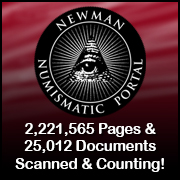
About UsThe Numismatic Bibliomania Society is a non-profit association devoted to the study and enjoyment of numismatic literature. For more information please see our web site at coinbooks.org SubscriptionsThose wishing to become new E-Sylum subscribers (or wishing to Unsubscribe) can go to the following web page link MembershipThere is a membership application available on the web site Membership Application To join, print the application and return it with your check to the address printed on the application. Print/Digital membership is $40 to addresses in the U.S., and $60 elsewhere. A digital-only membership is available for $25. For those without web access, write to: Terry White, Treasurer
AsylumFor Asylum mailing address changes and other membership questions, contact Terry at this email address: terrywhite5475@yahoo.com SubmissionsTo submit items for publication in The E-Sylum, write to the Editor at this address: whomren@gmail.com BUY THE BOOK BEFORE THE COINSale Calendar |
- WAYNE'S WORDS: THE E-SYLUM NOVEMBER 18, 2018
- ASYLUM WINTER 2018 ISSUE PUBLISHED
- NEW BOOK: CANADIAN GOVERNMENT PAPER MONEY 31ST ED.
- NEW BLOG: ANA COIN PRESS
- ARNALDO J. CUNIETTI-FERRANDO (1936-2018)
- DALE SEPPA REMEMBERS HOLLAND WALLACE
- SUBSCRIBER PROFILE: LIANNA SPURRIER
- NOTES FROM E-SYLUM READERS: NOVEMBER 18, 2018
- TOMMY THOMPSON TO SURRENDER GOLD SOUVENIR COINS?
- RUST RARE COIN ACCUSED OF PONZI SCHEME
- VOCABULARY TERMS: CABINET MEDAL
- OTIS TUFTON MASON (1838-1908)
- HARVEY STACK'S NUMISMATIC FAMILY, PART 31
- AN INTERVIEW WITH DEALER ANTHONY SWIATEK
- AN INTERVIEW WITH DEALER CHARMY HARKER
- CSNS EMERGING YOUNG PROFESSIONAL SCHOLARSHIP
- STACK’S BOWERS GALLERIES SEEKS CATALOGUER
- AMERICAN VETERANS MEDAL DESIGNS REVIEWED
- TRUMP AWARDS PRESIDENTIAL MEDAL OF FREEDOM
- BLOCK ISLAND QUARTER LAUNCH CEREMONY
- NUMISMATIC NUGGETS: NOVEMBER 18, 2018
- HESS DIVO AUCTION 335
- COINS STOPPED A BULLET AND SAVED A LIFE
- 1984-P ROOSEVELT DIME WITH CLASHED DIES
- UNION PACIFIC MOVIE TOKEN
- HAMILTON'S SOCIETY OF THE CINCINNATI MEDAL
- CIVIL WAR PHOTO SLEUTH
- LOOSE CHANGE: NOVEMBER 18, 2018
Click here to access the complete archive a
Click here to unsubscribe (scroll down)
To comment or submit articles, reply to whomren@gmail.com
Content presented in The E-Sylum is not necessarily researched or independently fact-checked, and views expressed do not necessarily represent those of the Numismatic Bibliomania Society.
WAYNE'S WORDS: THE E-SYLUM NOVEMBER 18, 2018
 New subscribers this week include: Nathan McAllister and Lianna Spurrier. Welcome aboard! We now have 5,779 subscribers.
New subscribers this week include: Nathan McAllister and Lianna Spurrier. Welcome aboard! We now have 5,779 subscribers.
Thank you for reading The E-Sylum. If you enjoy it, please send me the email addresses of friends you think may enjoy it as well and I'll send them a subscription (but let me know if they are located in the European Union). Contact me at whomren@gmail.com anytime regarding your subscription, or questions, comments or suggestions about our content.
This week we open with a new issue of our print journal The Asylum, one new book, a new blog, remembrances of two recently passed numismatists, and a new subscriber profile.
Other topics this week include cabinet medals, dealers Anthony Swiatek and Charmy Harker, the Presidential Medal of Freedom, the Block Island quarter launch, bullet-stopping coins, and Hamilton's Society of the Cincinnati medal.
To learn more about Canadian Government paper money, the End of Pitt token, the Emerging Young Professional Scholarship, American Veterans medal designs, Mormon Valley notes, the Spur Ryal of James I, clashed dies, and the buff bejeaned bird-man of Oklahoma, read on. Have a great week, everyone!
Wayne Homren
Editor, The E-Sylum
ASYLUM WINTER 2018 ISSUE PUBLISHED
The latest issue of our print journal The Asylum is on the way to the mailboxes of Numismatic Bibliomania Society members. Here is the table of contents and a message from our President Tom Harrison. Another great issue - I'm looking forward to reading the articles! -Editor
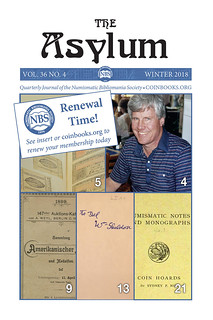 The Asylum
The Asylum
Winter 2018 Issue
Vol. 36, No. 4
In this issue:
- Message from the President By Tom Harrison
- Del Bland (1933–2018) By David F. Fanning
- An Afternoon at Princeton University By Ray Williams
- Off the Shelf: A Deluxe Edition of an 1899 German Sale of American Coins By David F. Fanning
- ASSOCIATIONS: Autographs • Annotations • Inscriptions
Del Bland’s William H. Sheldon-Inscribed Copy of Early American Cents: Before the Sheriff Nabbed the Switcher By Joel J. Orosz - Researching Your Ancient Coins By Shanna Schmidt
Message from the President
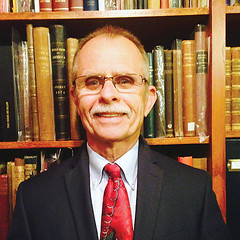 Would you like to significantly impact the vitality of the NBS? While our contributions to many larger organizations may seem negligible,
your commitment, modest or substantial, will play a critical role in the future of the NBS. The benefit action at this summer’s ANA convention
clearly demonstrated that an increased number of generous donors and bidders produced amazing results. This was a wonderful example of the membership
stepping up to ensure not only the stability, but also the vibrancy of our organization.
Would you like to significantly impact the vitality of the NBS? While our contributions to many larger organizations may seem negligible,
your commitment, modest or substantial, will play a critical role in the future of the NBS. The benefit action at this summer’s ANA convention
clearly demonstrated that an increased number of generous donors and bidders produced amazing results. This was a wonderful example of the membership
stepping up to ensure not only the stability, but also the vibrancy of our organization.
So, whether you are a longtime member or have just recently joined our ranks, your contributions to The Asylum, our benefit auction, or maybe most of all, your ideas for the betterment of the NBS will play a pivotal role in our success. It is only through increased membership involvement that we will continue to thrive during our 40th year and beyond. Please know your past efforts and future enthusiastic dedication are greatly appreciated, and yes, you will significantly impact the vitality of the NBS.
May your numismatic library provide investigation, discovery, and most of all, enjoyment.
NBS Membership Renewal Time!
Please renew your membership in the NBS to continue receiving The Asylum in 2019. Go to coinbooks.org to pay by PayPal or download a membership form today. Your current expiration date
is printed to the right of your name on your subscription envelope, which should be arriving soon.
Happy 40th, NBS!
In 2019, the Numismatic Bibliomania Society will be turning 40! To celebrate, we are compiling a special anniversary edition of The Asylum
where members share their stories from its inception through the years in the spring 2019 issue. Please send your remembrances to nbsasylum@gmail.com.
Back Issues
Kolbe & Fanning Numismatic Booksellers are now managing the distribution of back issues of the award-winning journal The Asylum. Back
issues are available in limited numbers.
Contact Kolbe & Fanning at orders@numislit.com or (614) 414-0855 to order.
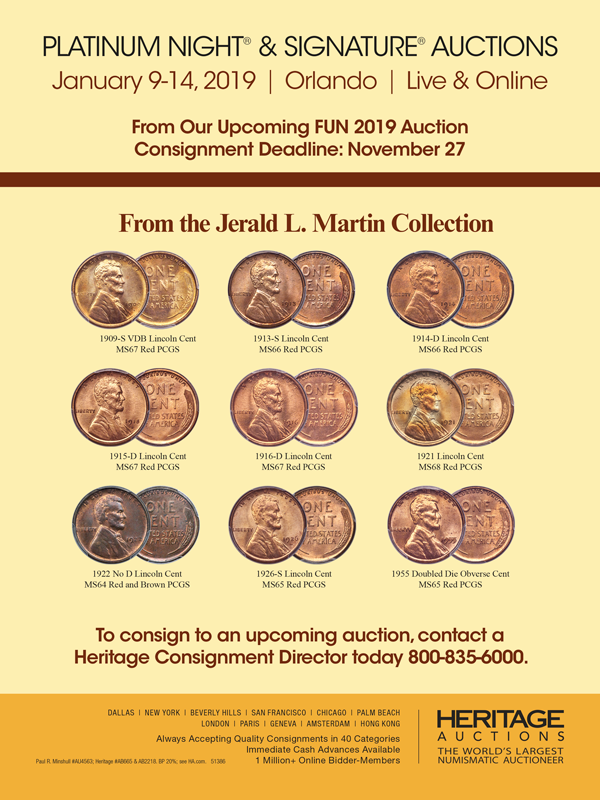
NEW BOOK: CANADIAN GOVERNMENT PAPER MONEY 31ST ED.
Charlton Press has released a new edition of Canadian Government Paper Money. Here's information from their web site. -Editor
 2019 Charlton Canadian Government Paper Money 31st Edition
2019 Charlton Canadian Government Paper Money 31st Edition
Editor: M. Drake
Price: CDN $35.00 US $28.50 UK £0.00
Release Date: November 26th 2018
Pages: 425
Dimensions: 7 x 9
ISBN: 9780889684096
Format: Spiral Bound
Dimensions: 425 pages
Published: November 26, 2018
Publisher: The Charlton Press
Language: English
ISBN: 9780889684096
The 31st edition of the Canadian Government Paper Money Catalogue has been reviewed to bring the prefixes of current notes, insert replacement notes and note registry census totals up to date. The Grading section has also been expanded to include example photos. The 31st edition of the Charlton Standard Catalogue of Canadian Government Paper Money consists of 440 7 x 9 inch pages, with the popular lie-flat spiral binding.
For more information, or to order, see:
2019 Charlton Canadian Government Paper Money
(http://www.charltonpress.com/NumismaticsBook.asp?v_ISBN=9780889684096)
NEW BLOG: ANA COIN PRESS
The ANA has announced the creation of a new numismatic blog, and it's open to members and nonmembers alike. -Editor

The American Numismatic Association (ANA) launched a new blog in November. A project that has been in the works for over a year, the new blog features exclusive articles for beginning and intermediate collectors, stories that previously ran in The Numismatist (the ANA’s monthly hobby publication), articles highlighting specimens and collections from the ANA Money Museum and more. Both ANA members and non-members can access the blog.
The name “ANA Coin Press” was selected for the new blog after the Association ran a naming contest. Collectors were asked to submit blog name ideas for the chance to win a prize valued at $100. The winner for the contest is Jake Miller, who received an MS-65 1881-S Morgan dollar as the grand prize.
For questions or more information regarding the blog, contact pr@money.org.
The American Numismatic Association is a congressionally chartered, nonprofit educational organization dedicated to encouraging the study and collection of coins and related items. The ANA helps its 25,000 members and the public discover and explore the world of money through its vast array of instructional and outreach programs, as well as its museum, library, publications and conventions. For more information, call 719-632-2646 or visit www.money.org.
To sign up for email blog notifications, see:
https://www.money.org/numismatic-blog
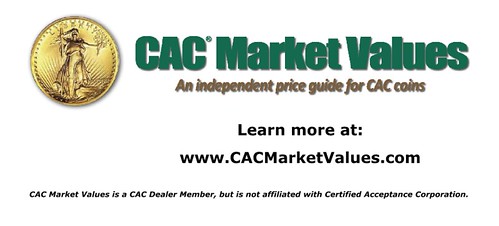
ARNALDO J. CUNIETTI-FERRANDO (1936-2018)
Horacio Morero and Justo Otaegui, members of Instituto Federal de Investigadores Numismáticos de la República Argentina (IFINRA), submitted this translation of a remembrance of Arnaldo J. Cunietti-Ferrando. Thank you. -Editor
 With deep sadness, we regret to inform the passing of Arnaldo J. Cunietti-Ferrando on November 3rd 2018, Founding Member and Honorary
President of the Instituto Federal de Investigadores Numismáticos de la República Argentina, IFINRA (Federal Institute of Numismatic Researchers
of the Argentine Republic).
With deep sadness, we regret to inform the passing of Arnaldo J. Cunietti-Ferrando on November 3rd 2018, Founding Member and Honorary
President of the Instituto Federal de Investigadores Numismáticos de la República Argentina, IFINRA (Federal Institute of Numismatic Researchers
of the Argentine Republic).
It is very difficult to summarize in these brief lines the immense legacy that Arnaldo left to the numismatic community.
He was Argentina’s greatest numismatic researcher for the last decades. Archives, museums and libraries, both in the country and abroad, had no secrets for him. He left no area of ??our discipline without studying: the first patriotic coins, the provincial coinage, the private emissions, the national coinage and, especially, the history of the Potosí mint and its coinage were the object of his interest and interminable curiosity. His vocation for knowledge was not only limited to coinage: paper money, tokens and, in particular, medals were also fertile grounds for his research.
His bibliographic production, which took place for more than half a century, was vast and covered a wide variety of topics. Along with a number of articles, publications and conferences, we also find his books, which are unavoidable reference for numismatists. His main books are the following: five editions of its catalog “Monedas Argentinas ("Argentinian Coins"); “Monedas y Medallas. Cuatro siglos de historia y arte” ("Coins and Medals. Four centuries of history and art"); “Historia de la Real Casa de Moneda de Potosí durante la dominación hispánica” (“History of the Royal House of Money of Potosí during the Spanish domination"); “Historia de las Medallas Argentinas” ("History of the Argentinian Medals"); and, more recently, “La Casa de Moneda de Potosí durante las Guerras de la Independencia” ("The Mint House of Potosí during the Wars of Independence").
But undoubtedly Arnaldo’s masterpiece was the "Cuadernos de Numismática y Ciencias Históricas" of the Buenos Aires Numismatic Center, which he founded and directed for forty years. Due to the quality of its articles, the variety of the topics treated and the care in its edition, in which the hand of Arnaldo was decisive, the “Cuadernos” are the principal bibliographical reference of Argentinian numismatics and have been considered in all fairness like a true encyclopedia of our discipline. Once his beloved “Cuadernos” culminated a cycle, he knew how to turn his editorial passion into the “Aportes de Numismática e Historia Argentina y Latinoamericana” ("Contributions of Numismatics and Argentine and Latin American History"), a publication of the Bonaerense Institute of Numismatics and Antiquities that he founded in 2015 and was currently directing.
He had a prolific institutional life as well. Member since his youth of the Argentine Numismatic Association, he joined the courageous group that, in an act of rebellion against the unipersonal conduction of the institution, gave birth half a century ago to the Buenos Aires Numismatic Center, to which he dedicated many years of his life. He was also a member of the Buenos Aires Institute of Numismatics and Antiquities and served as its President till the moment of his death. Following the tradition of the illustrious numismatists who founded the Board of American Numismatics, in 2011 he was appointed Corresponding Member of the National Academy of History. He was also a member or an honorary member of various numismatic institutions in Argentina and abroad. He enthusiastically supported the creation of IFINRA and was one of its founding members. On the occasion of the tribute that was offered at the 2nd Numismatic Conference of the Numismatic and Philatelic Center of Bariloche, we announced his appointment as Honorary President of the Institute, in recognition of his tireless work and for being an example for all of us.
He was founder and director for many years of the Historical and Numismatic Museum of the Banco de la Nación Argentina, which, under his efficient administration and expertise, managed to gather one of the largest public collections in our country, giving him a privileged position to devote all his efforts to the developing of numismatic science and to the enhancement of the national historical heritage.
With the passing of Arnaldo J. Cunietti-Ferrando there is left a void that will be impossible to fill. His gigantic legacy will forever be the testimony of a life dedicated to study and research, but, above all, the example of how to approach our science and be a numismatic researcher, as himself, intense and passionate.
Instituto Federal de Investigadores Numismáticos de la República Argentina (IFINRA).
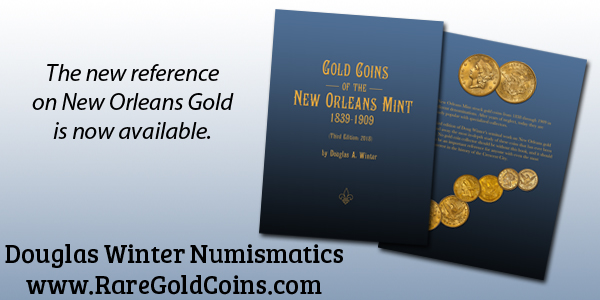
DALE SEPPA REMEMBERS HOLLAND WALLACE
Dale Seppa submitted this remembrance of numismatic researcher and author Holland Wallace. Thank you! -Editor
Friend-Numismatist-Author-Editor-Researcher
 Holland was born in Hidalgo County, Texas on the 21st day of March 1940 to Holland W. Wallace Jr. and Patricia Elliott Wallace. He
graduated from Weslaco High School, at age 17, in the class of 1957. He had been a National Merit Scholar and later attended Rice University before
transferring to the University of Texas School of Architecture.
Holland was born in Hidalgo County, Texas on the 21st day of March 1940 to Holland W. Wallace Jr. and Patricia Elliott Wallace. He
graduated from Weslaco High School, at age 17, in the class of 1957. He had been a National Merit Scholar and later attended Rice University before
transferring to the University of Texas School of Architecture.
Regardless of his academic achievements, Holland’s real love was coins and history and economics related to coins. After working as an architectural draftsman for a few years he went to work for Stanley K. Rupert, a well known San Antonio coin dealer where he gained a wide general knowledge of numismatics.
During this period he authored and published Central American Coinage Since 1821. In the words of the Central American numismatic scholar Brian Stickney:
“This handy 125-page book opened the field to collecting the seven countries now constituting Central America. Holland's work provided just enough background to arouse interest and provide historical context but, then, saturated the reader with numismatic detail not really seen in references to that date. Central American Coinage incorporated a plethora of photos along with each coin’s narrative description, weight, diameter, and metallic content along with prices in three-to-four grades and the occasional cryptic comment on rarity or variations. Also, for the first time, he provided extensive mintage data, where known. He set the tone for future endeavors addressing country, regional, and even global numismatic references works.”
COIN WORLD dated May 11, 1966 announced that Holland had joined the editorial staff of the Whitman Publishing Company in Racine, WI. Sometime in late 1966 or early 1967 Holland kindly invited Soterios Gardiakos and me to be his guests at Whitman. It was the first time I met him, and in the few hours we were together I learned many things previously unknown to me. He continued to be a source of help and information to me and many others over the next fifty years.
During his ten years at Whitman, Holland authored and edited many articles and books to include two editions of A Guide Book of Mexican Coins - 1822 to Date, Coins of the World 1750 – 1850 as well as working on the various books authored by R. S. Yeoman. Several of his articles were also published in the Whitman Numismatic Journal and other periodicals.
After the sale of Whitman to Western Publishing Holland moved to California and became a dealer specialized in Latin American coins. He issued regular price lists and had bourse tables at many major coin shows often working with Freeman L. Craig Jr. He lived with Craig for a short period until Freeman married Marney Albert in July of 1980. In conjunction with Craig, he finished a 250-page book entitled CROWN COINAGE OF THE AMERICAS which was never published due to the financial failure of the publisher. Based on letters from him and comments from others the decade he spent in California was the happiest period of his life.
When he subsequently decided to further his education he returned to Texas to attend San Antonio College (now UTSA) acquiring a degree in Information Systems. He subsequently returned to Weslaco to help his aging parents take care of his handicapped brother. With the death of his mother in 1994 his burden increased as there was now only one body to take care of a handicapped brother and a rapidly aging father. After the death of his father in 2001 the complete management of the family trusts fell upon Holland’s shoulders. By this time Holland was also in failing health so the burden was two-fold if not four-fold.
With failing health, and increased responsibility Holland commenced his long period of decline through no fault of his own. A flood in 2016 destroyed about ten thousand pounds of numismatic literature which must have been heartbreaking to a person that had built one of the finest, privately held Latin American Numismatic libraries in the world. The remaining four tons or so of Latin American numismatic literature have been moved by Freeman Craig, the executor of Holland’s will, to the establishment of Alan Workman in Orlando who will auction them off in 2019 for the benefit of the estate.
His last years passed largely in pain and he was often bed ridden for weeks and months at a time. Nevertheless he continued his research and email contacts, as long as he was still able, with the friends and associates that he had acquired over six decades as a professional numismatist and researcher.
Sad to see another great numismatist pass away but ashes to ashes and dust to dust – rest in peace my friend! You will be missed by many!
To read the earlier E-Sylum articles, see:
HOLLAND WALLACE (1940-2018) (http://www.coinbooks.org/v21/esylum_v21n42a14.html)
NOTES ON THE DEARLY DEPARTED
(http://www.coinbooks.org/v21/esylum_v21n43a06.html)

SUBSCRIBER PROFILE: LIANNA SPURRIER
The latest addition to the Newman Numismatic Portal is a home-page linked video on the the Nova Constellatios. Its creator is a new E-Sylum subscriber. Meet Lianna Spurrier, a college student with a taste for numismatic history and a talent for creating documentary-style videos. -Editor
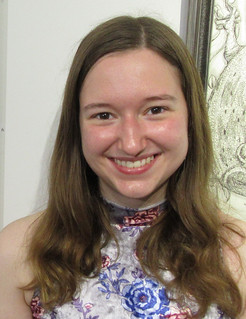 I’ve called myself a coin collector for most of my life. As a kid, I got foreign coins from the Tooth Fairy instead of money, so I
kept them in a little ceramic bank. That was my collection.
I’ve called myself a coin collector for most of my life. As a kid, I got foreign coins from the Tooth Fairy instead of money, so I
kept them in a little ceramic bank. That was my collection.
Fast forward a little. My grandmother’s brother was a hoarder, and when I was 11, she convinced him to move out of his house and my parents and I played a big part in cleaning it out. We found a little glass jar with probably about 50 wheat pennies in it, and I asked to keep it – after all, I already called myself a collector.
When I got it home I had to find out if any of them were valuable, so I started learning about mint marks and key dates, and pretty soon I had them all lined up by date. I got a Dansco album for them soon after and took off.
Through somewhere around 15 I collected avidly, but eventually school got in the way and I had to let it go. I hadn’t paid it much attention since then, but over this last summer (I’m now 21) I decided to catalog my collection and that got me back into it.
I discovered that there was actually a big community of collectors on Instagram, of all places – people buy, sell, and host giveaways, as well as just share their own collections and knowledge. I thought it seemed like fun, so I joined in.
A couple months ago, I entered a giveaway hosted by David McCarthy of Kagin's, for which the grand prize was a 2018/7 dated gold replica of the Plain Obverse Quint; only two were made, and were both struck over 18th century British guineas on an authentic screw press. It was all over Instagram for a month or so, and the winner was announced in the middle of September. Much to my shock, I won the gold replica!
At that point I had to know precisely what I had won, because I’d never heard of the Nova Constellatios before. I started doing some research, and found that there weren’t really any sources that answered all of my questions in one place. It was actually very surprising how poorly documented some aspects of the series were.
I’m a convergent media major at Morehead State University, which includes graphic design, journalism, and video production. In mid-October, I had to make a short documentary for a class, and I decided to cover the Nova Constellatios. We didn’t have very long to work on the project, so it absolutely consumed my life for a little under two weeks.
What most surprised me while working on it was how undocumented the third bit is. It took quite awhile to even confirm that it existed, much less find a picture of it – if you pay close attention, there’s only one photograph of it in the entire project. That’s the only one I could find! Many sources even incorrectly said that all three bits were found before 1900, which isn’t the case.
Overall, I really enjoyed working on this video, and have been astounded by the response – multiple numismatic news outlets have reached out, and David McCarthy himself saw it! It’s been really great to be able to share it with so many other collectors and spread the knowledge.
I graduate in May and intend to return to Louisville, KY, where I grew up. The plan was to go into graphic design, but the response from this project has made me start to consider some other options. Numismatic journalism, perhaps? Video production? Only time will tell.
Welcome aboard, and good luck in your career!
Lianna's video is a great debut for a new talent. At just over five and a half minutes long, the video is captivating and skillfully tells the story of what is arguably the most important set of coins in all of American numismatics. She's right that the available information on the set is scattered (and some of it is wrong); perhaps someone will publish a book or monograph someday. But I was glad to learn that the extensive holdings of the Newman Numismatic Portal figured heavily in her research. I think Eric P. Newman would be quite pleased at how his legacy project enabled a budding researcher to quickly assemble relevant facts and images. Now the video can help a whole new generation of collectors learn about the Nova Constellatio patterns. -Editor
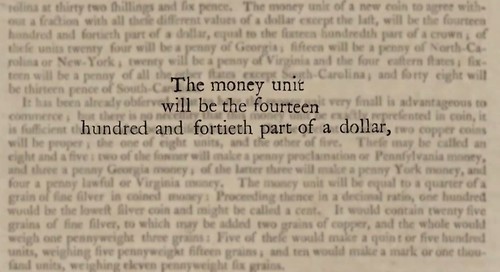
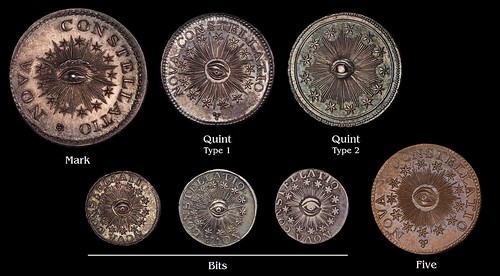
To watch the complete video, see:
Lost And Found: The Nova Constellatio Set (https://nnp.wustl.edu/library/book/557666) or
Lost & Found: The Nova Constellatio Set (https://www.youtube.com/watch?v=0bVMPYc17rc)
To visit Lianna's web site, see:
http://liannaspurrier.com/
For still more information about the Nova Constellatios, see Lianna's article on CoinWeek. Great banner image. I am informed that no coins were harmed in its production. -Editor
To read the complete article, see:
The Puzzle of the Nova Constellatios
(https://coinweek.com/us-coins/the-puzzle-of-the-nova-constellatios/)
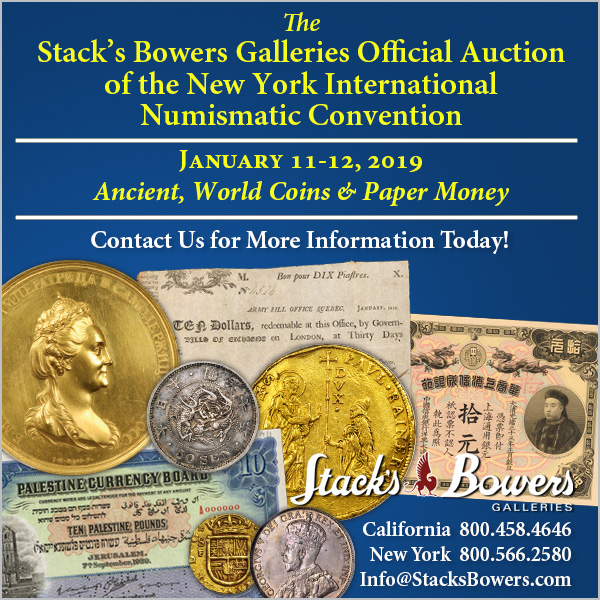
NOTES FROM E-SYLUM READERS: NOVEMBER 18, 2018
Congratulations to John Kleeberg
Mike Hodder writes:
Congratulations to John Kleeberg for the honour of the Archer M. Huntington Award.
I'll second that motion! -Editor
To read the earlier E-Sylum article, see:
ANS 2018 HUNTINGTON AWARDEE JOHN KLEEBERG
(http://www.coinbooks.org/v21/esylum_v21n45a13.html)
The End of Pitt Token
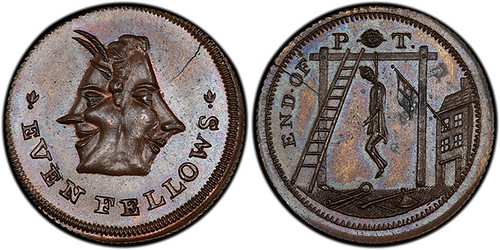
Regarding the token discussed in the last couple of issues, Allan Davisson writes:
Waters (1906) notes that the P (eye) T refers to Pitt, not Thomas Paine, apparently a rebus. Waters also thinks this more likely a Skidmore piece than a Spence piece. In Atkins, the predecessor to Dalton & Hamer, Waters notes it as END OF PITT, N. 798.
Michael Wehner passed along these comments from Bill McKivor. Thanks, everyone! -Editor
It is in Dalton & Hamer. I have had a couple of them. The PT at the top of the reverse has nothing to do with Thomas Paine. if you look closely, it has letter P, then an EYE in the center, then the T. P “eye” T, for Pitt. It is political, and is anti-Pitt, so it is End of P—T, or end of Pitt. The maker in this case is FOR Thomas Paine.
To read the earlier E-Sylum article, see:
NOTES FROM E-SYLUM READERS: NOVEMBER 11, 2018 : End of Pity Token?
(http://www.coinbooks.org/v21/esylum_v21n45a07.html)
Blind Man's Nickel Populations
Saul Teichman writes:
With regard to the blind man nickel patterns, there are at least 4 known of J1682 and at least 5 known of J1697.
Regrettably, I do not have great images of the edge device on these which is why one does not appear on the uspatterns.com website under either pattern listing.
I am attaching an image of the Harry Bass Foundation example that was sold in Heritage 2014 ANA sale with arrows pointing to 4 of the 5 bars on the obverse picture and 3 on the reverse image. The 5th bar is hiding under the upper right white arm which holds the coin in place.
If anyone owns an example and can supply an edge on image of either pattern, that would be greatly appreciated.
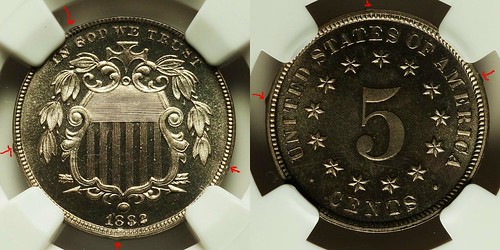
If any coins need to have edge photos taken, these do. -Editor
To read the earlier E-Sylum article, see:
BLIND MAN'S NICKEL PATTERNS
(http://www.coinbooks.org/v21/esylum_v21n45a10.html)
Roald Dahl's Anti-Israel Outburst
Vic Mason of Mamaroneck, NY writes:
I read with great interest that in 2014 the British government rejected giving the famous author Roald Dahl the honor of a commemorative coin on his 100th birthday in 2016, on the grounds of anti-Semitism. I just read Wikipedia on Dahl’s remarkable military, literary and personal lives. In the late 1990s, I had the opportunity several times to meet Dahl’s first wife, American stage and film star Patricia Neal, in Manhattan before her passing in 2010. Your article represents an interesting intersection of numismatic news with the tumultuous history of the 20th century.
As most of us know, Dahl was one of Britain’s most celebrated 20th-century writers. He would have deserved the recognition on a commemorative coin, had he not also been so impulsively outspoken, especially in the wake of the notorious 1982 massacre of many hundreds (some say thousands) of defenseless Palestinian civilians in Lebanon’s Sabra and Shatila refugee camps by Israel’s Phalangist allies. Dahl’s poorly chosen anti-Israeli comments at the time were quickly portrayed as anti-Semitic – he denied it – but the damage was done. Everyone who was living in the Middle East in 1982, as I was, vividly remembers the global uproar surrounding those events near Beirut, which forced the eventual resignation of Israel’s defense minister, Ariel Sharon, once one of Israel’s greatest generals, who eventually had to take “personal responsibility” for the Sabra and Shatila massacre.
According to Wikipedia, Dahl had a very distinguished World War II record in the Royal Air force, as he shot down a number of German and Vichy bombers as well as several German fighter planes in aerial combat in the Battle of Athens. Before that, he nearly died in the crash in the Egyptian desert of an obsolete RAF fighter plane he was piloting, after being given erroneous flight directions. The accident caused severe head injuries that left him temporarily unconscious and blinded for some time.
Dahl and Neal married in 1953 and had five children. She won the first-ever Tony Award in 1947 for Best Featured Actress in a Play. In 1963, she won the Oscar for Best Actress in “Hud.” In 1965, in her late 30s, Neal suffered three cerebral aneurisms, losing the ability to walk and talk, and Dahl took personal charge of nursing her back to health in the following years. Eventually she was able to resume her acting career. In 1983, Dahl and Neal divorced and he married an old flame, Felicity d’Abreu Crosland, who was related to the British Royal Family.
I was fortunate to meet Ms. Neal a few times in the 1990s, when she was invited to be a special guest at functions of Manhattan’s Twelfth Night Club, America’s oldest ladies-of-the-theater group, founded in the 1890s. I have been “a gentleman friend” of the club for over 20 years. At our last meeting in 1999, Ms. Neal signed her autobiography for club members and told them about her lead role in her final feature film, “Cookie’s Fortune,” which was released that year.
Thanks for filling us in on the background of this issue. -Editor
To read the earlier E-Sylum article, see:
AUTHOR ROALD DAHL PASSED OVER FOR COIN DESIGN
(http://www.coinbooks.org/v21/esylum_v21n45a20.html)
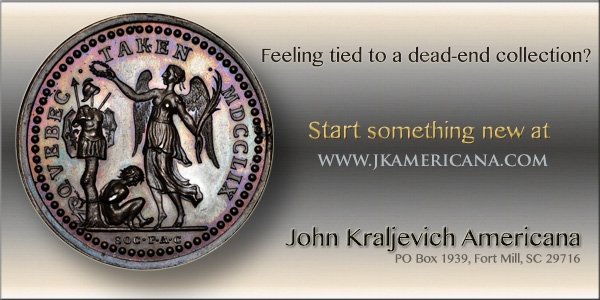
TOMMY THOMPSON TO SURRENDER GOLD SOUVENIR COINS?
There's been a development in the saga of Tommy Thompson, the jailed leader of the first expeditions that recovered gold treasure from the wreck of the SS Central America. Or has there? -Editor
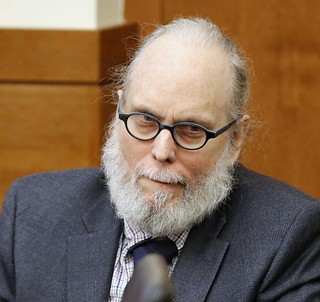 Treasure-hunter-turned-federal-fugitive Tommy Thompson agreed Wednesday to turn over the 500 gold coins at the center of a legal dispute
with investors who haven’t seen a dime of the riches he recovered 30 years ago from a shipwreck off the South Carolina coast.
Treasure-hunter-turned-federal-fugitive Tommy Thompson agreed Wednesday to turn over the 500 gold coins at the center of a legal dispute
with investors who haven’t seen a dime of the riches he recovered 30 years ago from a shipwreck off the South Carolina coast.
On the day that Thompson, 66, was scheduled to testify in a Franklin County courtroom as part of the lawsuit brought by one of the investors, the Dispatch Printing Co., he agreed to settle the case and surrender the missing gold rather than take the stand.
As part of the tentative agreement, Thompson is to deliver the coins to the court-appointed receiver in the case by 5 p.m. Sunday.
In the late 1980s, Thompson and his crew salvaged 3 tons of gold, silver and artifacts from the fabled 1857 shipwreck of the S.S. Central America steamship, an effort funded by about 300 Columbus-based investors. The value of the treasure was estimated at $100 million. The coins, minted from gold bars recovered from the ship, were among the items to be distributed to investors.
Not only did Thompson not pay any proceeds to the investors, he fled in 2012 with his assistant and sometimes girlfriend Alison Antekeier rather than show up for contempt hearings in federal court. They were on the run until January 2015, when they were arrested by the U.S. Marshals Service at a Hilton hotel in Boca Raton, Florida.
To read the complete article, see:
Tommy Thompson agrees to
surrender gold coins in tentative settlement
(https://www.dispatch.com/news/20181114/tommy-thompson-agrees-to-surrender-gold-coins-in-tentative-settlement)
Well, that was THEN. Here's an update published yesterday. -Editor
Two days after reaching a tentative legal settlement in which he agreed to surrender 500 missing gold coins, imprisoned treasure hunter Tommy Thompson testified Friday that he has no idea how to obtain the loot.
In testimony so meandering that the Franklin County Common Pleas judge interrupted several times to instruct Thompson to directly answer the questions, the 66-year-old former Battelle scientist suggested that the trust holding the coins likely wouldn’t respond to any inquiries because of ongoing litigation over the treasure he recovered from an 1857 shipwreck.
He also couldn’t identify the stranger who took the coins from his then-girlfriend in the lobby of a self-storage business in Fort Lauderdale, Florida, in 2010. He couldn’t recall the details of the exchange, other than making plans on the phone, and said that the stranger presumably deposited the coins in Belize, where Thompson had set up a trust.
“I wanted them to be safe,” Thompson said.
When confronted by Tigges about the judge’s order, Thompson said he is caught in a legal “conundrum.”
“I’m supposed to have the keys to my freedom by telling where the coins are, but I don’t know where the coins are,” he said. “I put them in an off-shore trust. The trustee can put them anywhere he wants. ... unless this is a Russian kind of thing, you can’t keep people in jail for no reason. I can’t access these coins.”
Under questioning from Quintin Lindsmith, attorney for the receiver, Thompson admitted that he considered the coins to be his personal property and took them for “my compensation.”
Thompson veered off in so many directions during his five hours on the stand that Beatty Blunt called for a recess early in the day to admonish him.
He was likely confusing jurors, she told him, despite having the intellect to recover lost treasure from 7,000 feet beneath the sea. “You are no dummy, sir,” she said.
To read the complete article, see:
Treasure
hunter Tommy Thompson testifies that he doesn’t have access to missing gold coins
(https://www.dispatch.com/news/20181117/treasure-hunter-tommy-thompson-testifies-that-he-doesnt-have-access-to-missing-gold-coins)
Regular readers may remember that what Thompson would be surrendering are NOT coins recovered from the SS Central America - these are modern commemorative souvenir pieces made from recovered material after the original sale. Every gold coin, bar and nugget salvaged from the wreck was carefully accounted for. -Editor


To read earlier E-Sylum articles, see:
S.S. CENTRAL AMERICA COMMEMORATIVE RESTRIKE CLUES
(http://www.coinbooks.org/esylum_v18n19a37.html)
S.S. CENTRAL AMERICA KELLOGG RESTRIKES STILL MISSING
(http://www.coinbooks.org/v20/esylum_v20n01a29.html)
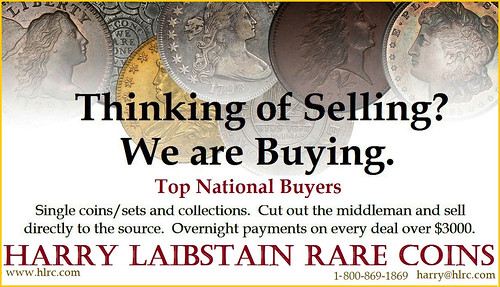
RUST RARE COIN ACCUSED OF PONZI SCHEME
Another legal action with a numismatic connection took place in Utah this week. -Editor
A federal judge has frozen the assets of a Utah rare-coin dealer after state officials accused the business of defrauding hundreds of people in a precious metals Ponzi scheme.
A civil complaint was filed Thursday by the Securities and Exchange Commission against Gaylen Dean Rust and his company, Rust Rare Coin Inc.
The Utah Department of Commerce said in a Friday news release that Rust had fraudulently obtained more than $170 million from people in Utah and 16 other states in a scheme involving silver.
Rust told investors the silver was kept at a depository in Salt Lake City or Los Angeles — even though the company never purchased or stored anything of that value at those locations.
And the investor money was not used to buy silver, either.
“Instead, the defendants misappropriated investor funds,” the news release states, “and used these funds to make payments to other investors in the manner of a Ponzi scheme, transfer money to other companies owned by Rust, and pay personal expenses.”
His family was also swept up in one of Utah’s biggest news stories, the forgers and eventual mail bombings of Mark Hofmann. Rust’s father, Alvin, paid $150,000 to try to get the “McLellin Collection,” papers allegedly written by early Mormon apostle turned apostate William McLellin.
Al Rust authored Mormon and Utah Coin and Currency. The book was first published in 1984 and was later updated to identify many fake notes that were the product of master counterfeiter Mark Hofmann. -Editor
To read the complete article, see:
Utah rare coin dealer accused of defrauding investors in a $170 million Ponzi
scheme involving silver (https://www.sltrib.com/news/2018/11/16/utah-rare-coin-dealer/)
VOCABULARY TERMS: CABINET MEDAL
Dick Johnson submitted these entries from his Encyclopedia of Coin and Medal Terminology. Thanks. -Editor
Cabinet Medal. One of a group of small portrait medals issued by the United States Mint in the mid 19th century. The first bore a portrait of George Washington and the inscription "A Memorial of the Washington Cabinet May 1859." Most are slightly larger than a dime – numismatically a medalet – bear portraits of Washington, Jackson, Lincoln, Grant and Garfield, were frequently muled, and some were still available in the 20th century as list medals.
The vast popularity for Washington medals prior to the Civil War led U.S. Mint Director James Ross Snowden to issue two Washington medals, a subject close to his interest, as he was the author of a book on Washington medals and he built an exhibit of these in a vacant room in the U.S. Mint building in Philadelphia. The first was a small medal mentioned above; the second bore a Houdon inspired portrait on the obverse, and an exhibit case surmounted by a bust of Washington on the reverse (PR-23).
Snowden's chicanery in his mint position has been well documented. He had restruck early U.S. coins from dies still in the mint, and traded these copies to numismatists of the time for specimens he wanted for the mint collection. While criticized for this activity, he was, however, allowed to issue medals at the mint by his own authority. Thus came into existence the two Washington medals he instigated, the smallest of which was the forerunner of a series of medalets called “cabinet medals.” (The "cabinet" in this term refers to the furniture which held the medal collection in the mint's exhibit room – and not the cabinet of the president's department chiefs.)
Snowden's successor, Mint Director James Pollock, who came into office May 1861, continued issuing small portrait medal issues. He resurrected an 1833 Andrew Jackson portrait (if it hadn't already been ordered by Snowden) and Mint Engraver Anthony C. Paquet copied the Jackson portrait for a new cabinet medal. Pollock introduced a twist by muleing the Jackson portrait with one of Washington to create still another variety to sell to the public.
A Lincoln medal was added to the series in 1864 and this was quickly muled with Washington. In all, five presidents were portrayed, Washington was muled with all but Garfield; Lincoln was muled with all but Jackson. Die varieties exist of these cabinet medals, particularly the Lincoln pieces, as dies broke and were replaced.
At first, cabinet medals were issued in silver with a few in gold. Most were 19mm in diameter – the size of the bronze cent – easy to blank probably with cent blanking dies and easy to strike, all with existing mint equipment. Bronze cabinet medals were not struck until after 1869 according to Robert Julian who researched the U.S. Mint records extensively for his monumental work, Medals of the United States Mint; The First Century, 1792-1892 (see pages 97-108).
Many of the cabinet medals – bronze, silver or gold – were ordered by private citizens; some by incumbent or former mint officials; others struck for "over-the-counter" sale to the public. Demand for the small presidential portrait medalets rose with events of the day, and Lincoln's assassination brought a flurry of interest for his medallic memorials, as was U.S. Grant's inauguration March 4, 1869. The 1876 Centennial Exposition in Philadelphia climaxed the demand for these pieces, and even though Garfield's medal was added in 1881 (with a Lincoln mule) demand had peaked, and none created after this date.
In the 20th century eleven of these cabinet medals were offered as List Medals (List numbers 601 through 616; 604 is Snowden's large Washington Cabinet Medal; number 605, 610, 613-14 are not in this series). This series was phased out in the 1980s, no cabinet medals are currently offered. Still these medalets of presidents was a forerunner of the large presidential medal series still active a century later.
The early cabinet medals must have been a delight for jewelers, who mounted the tiny medals as charms, in frames, bezels, even encased in watch cases covered with glass (watch crystal mounting). Infrequently these come on the market today, still in such 19th century mountings.
References:
O37 {1977} Julian.
O19 {1969} United States Mint.
Looking for the meaning of a numismatic word, or the description of a term? Try the Newman Numismatic Portal's Numismatic Dictionary at: https://nnp.wustl.edu/library/dictionary
Or if you would like a printed copy of the complete Encyclopedia, it is available. There are 1,854 terms, on 678 pages, in The Encyclopedia of Coin and Medal Technology. Even running two a week would require more than 19 years to publish them all. If you would like an advance draft of this vital reference work it may be obtained from the author for your check of $50 sent postpaid. Dick Johnson, 139 Thompson Drive, Torrington, CT 06790.
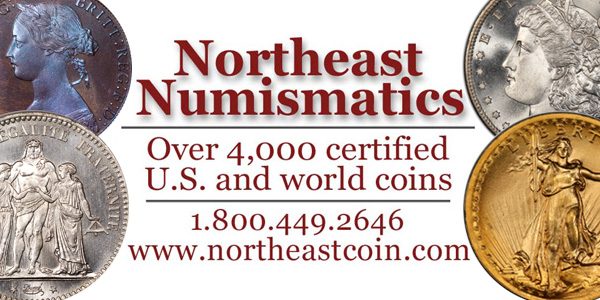
OTIS TUFTON MASON (1838-1908)
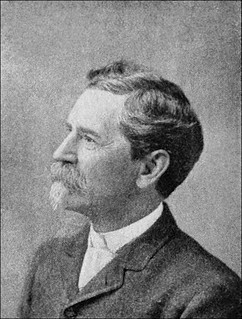 Otis Tufton Mason (1838-1908), PhD, L.L.D., was born the fifth of eight children, on April 10, 1838, at Eastport, Washington County, Maine,
son of John Mason (1799-1888), and Rachel Lincoln Mason (1810-1889).
Otis Tufton Mason (1838-1908), PhD, L.L.D., was born the fifth of eight children, on April 10, 1838, at Eastport, Washington County, Maine,
son of John Mason (1799-1888), and Rachel Lincoln Mason (1810-1889).
Otis Tufton Mason was a remarkable American anthropologist who studied Native American Indian basketry, travel habits, and ethnological aspects of human culture especially in numismatics. He was possibly related to Ebenezer Locke Mason, Jr., since his own brother was named Ebenezer Erskine Mason (1829-1910), who was born the same year as E. L. Mason, Jr., born at Portland, Maine.
He married Sarah Elizabeth Henderson (1835-1900). They had five children : John H. Mason (1863-1864), George E. Mason (1866-1879), Emily Tufton Mason (1868-1904), and William R. Mason (1874-1875).
In 1861, he graduated Columbia University, now George Washington University.
n 1880, he was a member of the Numismatic and Antiquarian Society of Philadelphia.
He was curator of Ethnology, in the United States National Museum, The Smithsonian Institution, Washington DC.
In 1902, he was made head curator of Anthropology, the United States National Museum, The Smithsonian Institution, Washington DC.
In 1893, he published : North American Bows, Arrows, and Quivers (The Smithsonian Institution, Washington DC.)
He died of paralytic stroke on November 5, 1908 at Washington DC., and is buried there in Oak Hill Cemetery.
The topic of O. T. Mason came up this week when Ray Williams was searching for information on a colonial paper note pedigreed to an O. T. Mason. John Lupia kindly furnished this bio from his files. But is it the same person? This Mason died in 1908; in 1935 Harley Freeman bought a colonial paper collection from an O. T. Mason. Was that purchase from Mason's estate? More sleuthing is required, but this may well turn out to be our man. Thanks, everyone. -Editor
To read the complete article, see:
MASON, OTIS TUFTON
(https://sites.google.com/a/numismaticmall.com/www/numismaticmall-com/mason-otis-tufton)
The entire inventory of the Lupia Numismatic Library is for sale. Individual items will be available before the remaining archives are broken up into parcels sold at philatelic auctions in the U. S. and Hong Kong. Check NumismaticMall.com frequently as dozens of new items with estimates will be posted daily until everything is sold.
All inquiries will be given prompt and courteous attention. Write to: john@numismaticmall.com .
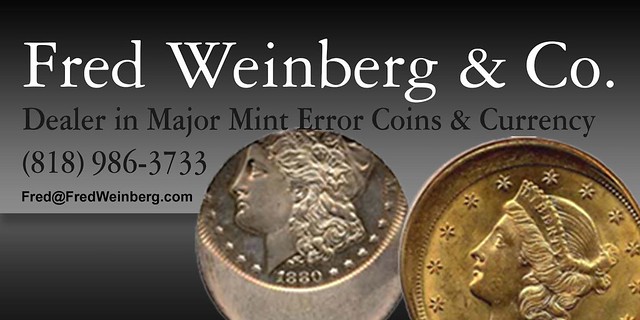
HARVEY STACK'S NUMISMATIC FAMILY, PART 31
Harvey Stack's blog series focuses on growing up in a numismatic family. Here is part 31, opening in 1962. Nothing beats a report on numismatic events and personalities direct from someone who was there to witness them in person. Thanks, Harvey! -Editor
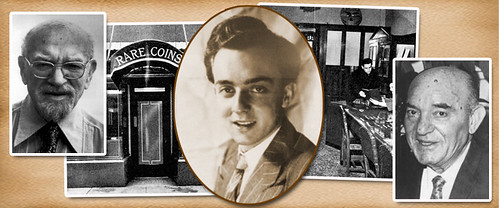
Collectors learned that the Mint was still producing over three million Proof sets each year and that sales were not keeping up. Large stores were building up in the Mint's vaults. Rolls and bags of current issues of U.S. coins in Mint State lost much of their premium, and collectors returned to building collections of more classical coins. This revival led some old time collectors to decide to sell their collections, as it was an opportunity to get a more favorable price. These collections could be quite comprehensive, even including more modern pieces. These became available, sometimes intact, and could be sold to beginner collectors who appreciated having some of the initial work done for them.
Collectors who had basic "short sets" could advance by expanding them into full runs or by specializing in a series that had more interest for them. It could put them on the path to investigating die varieties as well as earlier issues. Many moved on from Proof sets and modern coins to half cents, large cents, half dimes, and early dimes, quarters, half dollars and silver dollars. The additional challenge of completing collections piece by piece, either of a series or of varieties, was very enjoyable and brought casual collectors deeper into the hobby. Old time collections coming on the market resulted in more fresh coins, increasing interest in numismatics by making things more exciting.
Stack's continued to be a leading public auctioneer, providing specialized catalogs for the sale of the most desirable collections. In 1962 we were fortunate to start the spring season with a few smaller collections. We then were the official auctioneer for the Greater New York Numismatic Convention where we were privileged to offer The R.E. Cox Collection of Half Dollars, 1794 to date: a date, die variety and mintmark collection with over 500 different coins. Though not complete with every known variety, it was complete as to all varieties then listed in the Guide Book. It also contained rarities that were rarely seen in the market place. It was one of the most outstanding collections of half dollars and collectors were very enthusiastic.
At the sale we had one of the largest audiences to participate in a specialized collection we had every experienced. The collection contained outstanding half dollars of 1794, 1795 3 Leaf, both l796 varieties as well as 1797. The extremely rare 1838-O was offered as was the 1847/6, 1853-O No Arrows, 1866-S No Motto, 1870-CC, 1878-S, and the 1892-O with Microscopic O. The R.E. Cox Collection was known nationwide, as Mr. Cox had showed the coins at many exhibits, coin shows and schools. He was dedicated to displaying his collection, and prepared for each coin a cardboard holder, 2 X 3 inches. In the center of each holder he placed a coin and hand-labeled each with pertinent information about the coin. These blocks were placed in frames measuring 2-1/2 by 3-1/2 feet in size, in perfect order by date and mint, with the great rarities highlighted in the frames. It was a great way to show the coins for a public exhibition.
At the Stack's auction, each coin was offered still in its individual holder, which were delivered to the buyers along with the coins as proof of pedigree. Many were retained in their original holders until more recent times as collectors found other ways of showing and keeping their coins. However, to this day many of the Cox Collection coins still remain as they were sold in 1962, preserved as they were housed originally.
At the same time that we sold the Cox Collection, in the same catalog we offered other collections, collectively making the sale have well over 3,000 lots. This sale was a highlight of the year. Other fine auction offerings would follow in 1962, as I will describe in my next article.
To read the complete article, see:
Harvey Stack Remembers: Growing up in a Numismatic Family, Part 31
November 13, 2018 (https://www.stacksbowers.com/News/Pages/Blogs.aspx?ArticleID=3173)
To read the earlier E-Sylum article, see:
HARVEY STACK'S NUMISMATIC FAMILY, PART30
(http://www.coinbooks.org/v21/esylum_v21n44a18.html)

AN INTERVIEW WITH DEALER ANTHONY SWIATEK
Local newspapers can be good sources of information for their interviews with hometown coin designers, collectors and dealers. The Saratogian published an interview with dealer Anthony Swiatek. Here's an excerpt. In the photo he's holding a fake copy of a $10,000 U.S. bill featuring Salmon P. Chase. -Editor
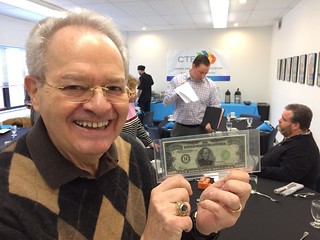 BOCES Career & Technical Education culinary students hosted a recent Kiwanis Club luncheon where prominent numismatist Anthony Swiatek
discussed old coins and currency, which might be worth a great deal more than their owners realize.
BOCES Career & Technical Education culinary students hosted a recent Kiwanis Club luncheon where prominent numismatist Anthony Swiatek
discussed old coins and currency, which might be worth a great deal more than their owners realize.
Swiatek and his wife, Gloria, own Minerva Coins and Jewelry, located on the first floor of their Italian villa-style building at 63 Spring St., overlooking Congress Park.
A leading authority in his field, Swiatek is past president of the 32,000-member American Numismatic Association and was on its board for 10 years. He also authored the 712-page “Encyclopedia of the Commemorative Coins of the United States,” and has been an expert witness for the U.S. Attorney’s Office on coin fraud and coin grading.
During the Clinton administration, Swiatek was invited to Washington, D.C., for White House ceremonies to mark the striking of the Sacagawea dollar.
Swiatek told Kiwanians about the 5,500 Sacagawea dollars that General Mills included in boxes of Cheerios, prior to the coin’s release for general circulation. Five years later, it was discovered that there is more detail in the tail feathers of Cheerios Sacagawea dollars, compared to those produced for circulation.
Because there are so few Cheerios versions of the coin, those in mint condition are quite valuable. Ten years ago, one sold for $34,500.
So Swiatek encouraged listeners to go through old coin collections and try to determine their worth.
“You never know,” he said.
To read the complete article, see:
Expert:
Coins worth more than meets the eye
(https://www.saratogian.com/news/local-news/expert-coins-worth-more-than-meets-the-eye/article_e3e76b42-e8f4-11e8-95b2-974b7d71f517.html)
AN INTERVIEW WITH DEALER CHARMY HARKER
The numismatic press of course, is a great source of interviews as well. This week Joshua McMorrow-Hernandez of CDN Publishing released a video interview with “The Penny Lady,” Charmy Harker. Here's the summary; follow the link to the CDN site to watch the video. -Editor
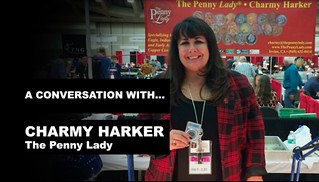 Charmy Harker, more famously known as “The Penny Lady,” may deal in small change but her business is anything but small. The Irvine,
California, coin dealer attends many major shows around the country each year, and her inventory includes some of the toughest high-grade and
key-date pennies around. Her showcases, which seem to virtually shimmer in reddish-orange hues, contain a wide variety of three, four-, and
five-figure Indian Head and Lincoln cents as well as other popular coins.
Charmy Harker, more famously known as “The Penny Lady,” may deal in small change but her business is anything but small. The Irvine,
California, coin dealer attends many major shows around the country each year, and her inventory includes some of the toughest high-grade and
key-date pennies around. Her showcases, which seem to virtually shimmer in reddish-orange hues, contain a wide variety of three, four-, and
five-figure Indian Head and Lincoln cents as well as other popular coins.
When I caught up with Harker at the Baltimore Whitman Expo in October 2018, she had just flown in from California with several hundred beautiful pennies, including several major key-dates boasting color and grades worthy of a place in the finest of registry sets. She was also busy buying! She took some time to talk about her beginning in the hobby, and her introduction to coins some 25 years ago began as it does for so many of us – she inherited a coin collection and decided to learn more about the coins. “I didn’t have time to learn all the different series, so I decided to do one at a time,” she recalls. “I picked the penny to start with because the Indian cent is really pretty, and I fell in love with it. I didn’t care to learn about the others.”
After more than 20 years as a coin dealer, Harker as seen her share of pretty pennies. One particular Indian Head cent was among the top offerings at her booth in the Baltimore Expo coin show. It was an 1873 Doubled Liberty MS64BN, “a tough coin to find in uncirculated condition,” she explains. Lincoln cents also dominate her inventory and one specific beauty stood out: a 1916 PR66RB matte proof. “I hadn’t had one in a while. The ’09 VDB [proof Lincoln cent] is super tough, but the 1916 [proof] is the second.”
To watch the video, see:
Charmy Harker Talks About Pretty Pennies
(http://blog.greysheet.com/charmy-harker-talks-about-pretty-pennies/)

CSNS EMERGING YOUNG PROFESSIONAL SCHOLARSHIP
Central States has created a scholarship program to help young dealers entering the numismatic business. -Editor
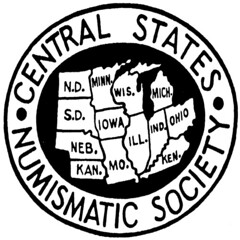 Central States Numismatic Society is proud to announce the formation of a new scholarship for young numismatic professionals to attend the
ANA’s Summer Seminar. The Emerging Young Professional Scholarship sponsored by Eagle Eye Rare Coins in Tucson, AZ is designed to help nurture
and educate young dealers and help them build a professional network through attending Summer Seminar.
Central States Numismatic Society is proud to announce the formation of a new scholarship for young numismatic professionals to attend the
ANA’s Summer Seminar. The Emerging Young Professional Scholarship sponsored by Eagle Eye Rare Coins in Tucson, AZ is designed to help nurture
and educate young dealers and help them build a professional network through attending Summer Seminar.
As Eagle Eye Rare Coins owner, Rick Snow, said, “It is difficult to get into the coin business without the help and guidance from established dealers. I could not have begun my career in numismatics without the support of the dealer I worked for prior to starting Eagle Eye Rare Coins in 1992, Elliott Goldman. It is my hope that this scholarship will help an emerging numismatist make that leap into a professional career.”
CSNS President Mitch Ernst added, “We all have heard that YN’s are the future of the hobby. Yet, no one has thought about helping the future of the dealer side of the hobby. It is our hope that this scholarship will help fill that need.”
Applicants must be thirty years of age or younger, prove they are employed in the numismatic trade, complete and return the CSNS scholarship application prior to the deadline of January 31 st , 2019. Applications will be found in the J/F/M 2019 issue of CSNS’ The Centinel. However, you can also request an application by writing to Mitch Ernst P.O. Box 24559 Omaha, NE 68124. You can also request an application by email at president@centralstatesnumismaticsociety.org Full details of and information about the scholarship can be found in the application.
STACK’S BOWERS GALLERIES SEEKS CATALOGUER
E-Sylum readers are a smart bunch, so I thought I'd mention this writing opportunity found in the November 16, 2018 issue of their E-Newsletter (Vol. 7, No. 46). -Editor

DO YOU ENJOY RARE COINS? DO YOU ENJOY WRITING?
If so, we invite you to apply for an opening with Stack’s Bowers Galleries, leading rare coin company and auctioneer. You will work at our Orange County headquarters in warm and sunny Southern California. You will help prepare authoritative, interesting descriptions for rare coins, tokens, medals, and paper money for our auctions and other presentations. A general knowledge of Guide Book-listed series is required, plus the ability to use research and other sources. You will become part of what we like to call our dream team of professionals.
Send us your resume, samples of any writing you have done, and other information. We look forward to hearing from you! Careers@StacksBowers.com .
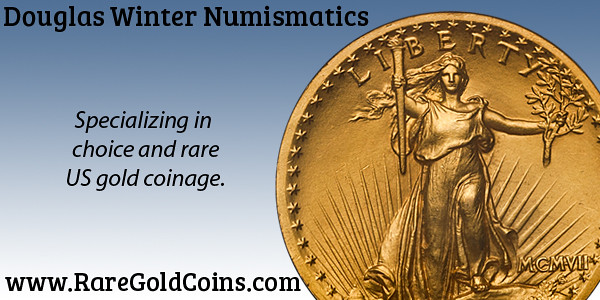
AMERICAN VETERANS MEDAL DESIGNS REVIEWED
A Coin Update Blog article published November 14, 2018 shows all of the design submissions for the American Veterans medal reviewed at this week's meeting of the Citizens Coinage Advisory Committee (CCAC). Here are some selections. -Editor
Some Obverses:
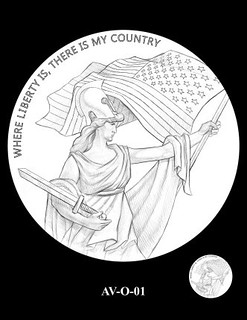

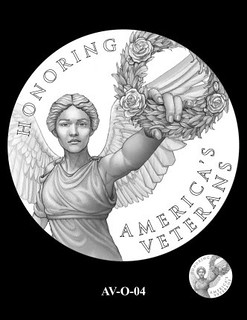
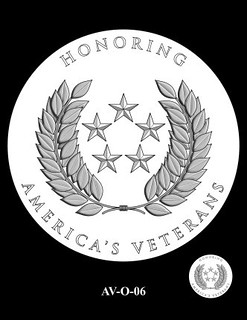
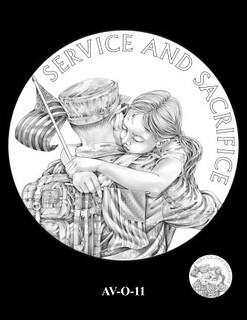

I think this was a good batch of submissions. While some are perhaps too spare or too busy, all seemed well executed. The problem is always in projecting what a flat two-dimensional image could become in 3-D once rendered by a sculptor and transformed into a physical coin. These are tough choices and the CCAC has a hard job to do.
Obverse 4 stuck out for me - a somber winged Liberty laying a wreath. It's another ethnic Miss Liberty, and that's fine by me. Obverse 11 is a touching scene of a reunion (or is it a goodbye?). Obverse 13 is a bit of beefcake but I like the classic style and the use of the Great Seal on the soldier's shield. -Editor
Some Reverses:
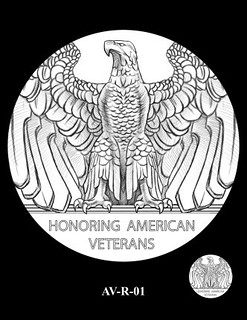

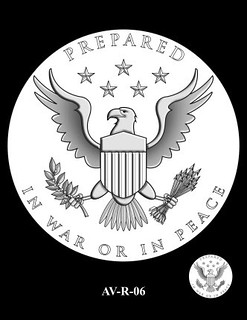
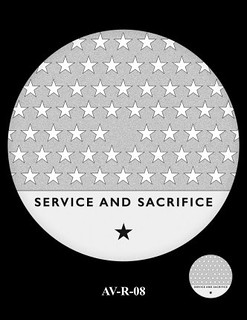
Reverse 01 has promise. It's nice to see a different treatment of the classic eagle. This one reminded me of the stone carvings seen on many Depression-era government buildings such as post offices. On the other hand, sometimes there's a reason why certain treatments haven't been tried before. I don't know what the CCAC thought of Obverse 8, but the impression it gave me was of a pigeon about to poop on the flag.
Reverse 8 is subtle and powerful. The field of stars is missing one, representing the sacrifice of a soldier. The star appears below in what I think is drawn to represent an incuse design, reinforcing the theme of absence. Combined with Obverse 4 (Liberty laying a wreath), this would be a coin embodying powerful emotions, among the highest examples of the medalist's art.
The CCAC chose Reverse 08, paired with either Obverse 03 or 04. I didn't care for Obverse 03 and wouldn't have offered that option. I think O4-R8 is a clear winner. See the complete article online for all the designs. -Editor


To read the complete article, see:
CCAC November 14, 2018, meeting: American Veterans
medal (http://news.coinupdate.com/ccac-november-14-2018-meeting-american-veterans-medal/)
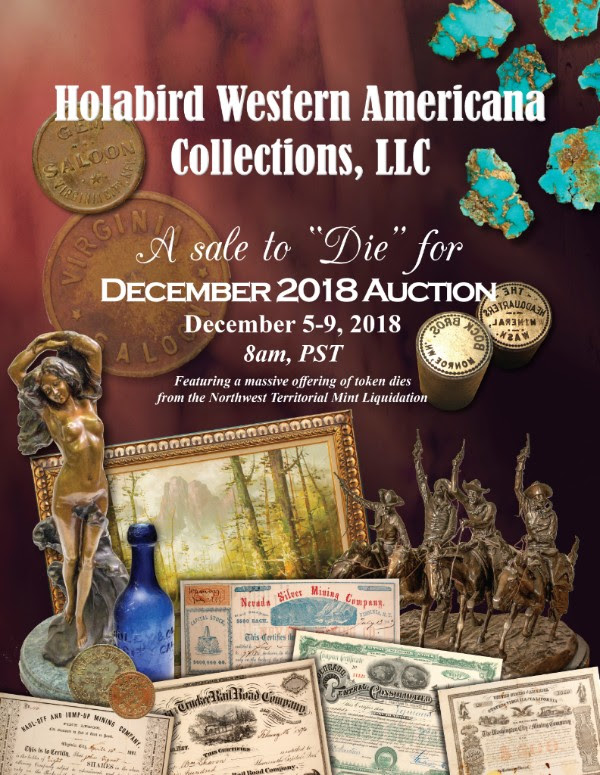
TRUMP AWARDS PRESIDENTIAL MEDAL OF FREEDOM
This week President Trump awarded the Presidential Medal of Freedom to seven Americans. Here's an excerpt from a Washington Post report. -Editor
President Donald Trump mused Friday that the late Supreme Court Justice Antonin Scalia, a father of nine, had been "very busy." He said the White House employee responsible for cutting off an Elvis Presley song partway through had "no promotional ability."
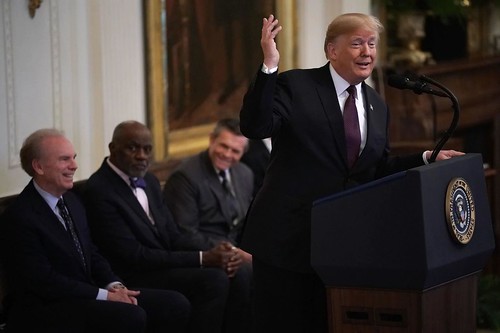
He told baseball owner George Steinbrenner's grandson that Steinbrenner was "a real piece of work," and exhausting to be with, although worth the effort. He reeled off baseball facts that weren't in his prepared script, and told a golf story.
Along the way, Trump awarded the Presidential Medal of Freedom to seven Americans, including Scalia, sports figures Babe Ruth, Roger Staubach and Alan Page, singer Elvis Presley, retiring Sen. Orrin Hatch, R-Utah, and Republican megadonor and philanthropist Miriam Adelson.
The award, created by President John F. Kennedy, is the nation's highest civilian honor. Scalia's widow accepted on his behalf, as the man Trump chose to replace him, Justice Neil Gorsuch, looked on. Six of the court's nine justices attended, including the newest, Justice Brett Kavanaugh.
Trump, seeming jovial and relaxed, said he was pleased to be the president to finally honor Ruth.
"I mean, let's face it. Babe Ruth is Babe Ruth, right?"
He then went on an extended riff about Ruth's early career as a pitcher that departed from the printed script visible on screens at the back of the room. He added a riff about his friend Steinbrenner, who bought the Yankees 25 years after Ruth's death.
When he got to Elvis, a recording of the gospel and rock singer singing "How Great Thou Art" played for a few moments, then faded out. Trump looked annoyed.
"That was my idea. I said, 'Give me a little - a little song.' That was, I guess, a little promotional ability."
To read the complete article, see:
Trump jokes and jabs as he bestows Presidential Medal of Freedom
(https://www.washingtonpost.com/politics/trump-jokes-and-jabs-as-he-bestows-presidential-medal-of-freedom/2018/11/16/461cc106-e9de-11e8-bbdb-72fdbf9d4fed_story.html?utm_term=.429d9a9a65e3)
The Chicago Tribune published the same story with some additional photos. -Editor
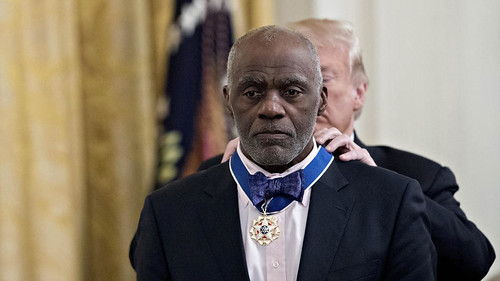
Alan Page, former professional American football player, is presented the Presidential Medal of Freedom by President Trump
A numismatic connection, in addition to the medals themselves, is that recipient Orrin Hatch has sponsored many a bill relating to U.S. coinage in his long congressional career. QUICK QUIZ: who can name some of the coins or coin programs sponsored by Hatch? -Editor
To read the complete article, see:
Trump jokes, jabs as he
bestows Presidential Medal of Freedom to seven Americans
(https://www.chicagotribune.com/news/nationworld/politics/ct-presidential-medal-of-freedom-20181116-story.html)
THE BOOK BAZARRE
BLOCK ISLAND QUARTER LAUNCH CEREMONY
The The Westerly Sun of Pawcatuck, CT published a nice article and gallery of photos about the Block Island National Wildlife Refuge quarter launch ceremony held earlier this week. -Editor
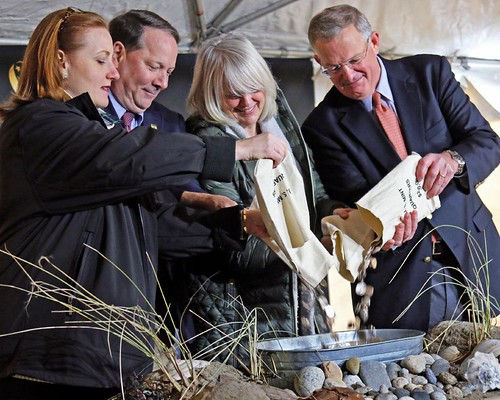
The ceremonial first pour of the new quarter at the ceremony that launched it on Thursday, November 15, 2018, at the Kettle Pond Visitor Center included Margaret Everson, Principal Director of the U.S. Fish & Wildlife Service, left, Jim Kurth, deputy director of the U.S. Fish and Wildlife Service, Rhode Island Department of Environmental Management Director Janet Coit and David Ryder, director of the United States Mint
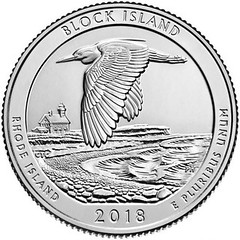 Depicting a black-crowned night heron in flight above Cow Cove beach, a new quarter featuring the Block Island National Wildlife Refuge was
launched Thursday at the Kettle Pond Visitor Center, in a ceremony that was live-streamed to Block Island. Charles Vandemoer, project leader for
Rhode Island National Wildlife Refuges, was master of ceremonies.
Depicting a black-crowned night heron in flight above Cow Cove beach, a new quarter featuring the Block Island National Wildlife Refuge was
launched Thursday at the Kettle Pond Visitor Center, in a ceremony that was live-streamed to Block Island. Charles Vandemoer, project leader for
Rhode Island National Wildlife Refuges, was master of ceremonies.
David Ryder, director of the United States Mint, was joined by state Sen. Dennis Algiere, R-Westerly, and Rep. Blake Filippi, R- Block Island; Narragansett Tribal Elder Robin Spears; Rhode Island Department of Environmental Management Director Janet Coit; and Jim Kurth, deputy director of the U.S. Fish and Wildlife Service. There was also a sizable audience of excited coin collectors.
Chariho students had leading roles in the ceremony, and Humanities Specialist Dana Hall said the students were thrilled to participate.
“It’s such an important event,” she said. “To be part of the ceremony for a coin, they called on Chariho, and it’s such an honor.”
Charlestown Boy Scout Troop 15 and Eagle Scout Cody Clarkin opened the event with the presentation of colors and the Pledge of Allegiance. Members of Chariho High School Vocal Select sang the national anthem and “America the Beautiful,” and students from John Labriola’s Grade 7 and 8 science classes at the middle school presented background information on the elements of the coin’s design.

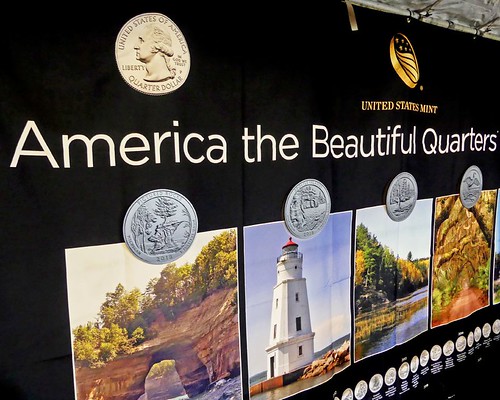
These are great events for the Mint and local communities. The coin's artist is usually present to take a bow. -Editor
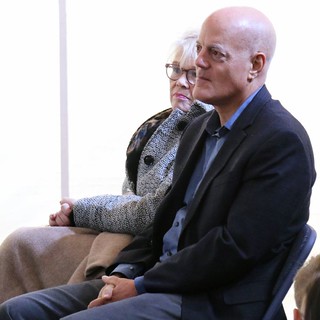 Boston artist Chris Costello, who has designed several quarters, said the inspiration for his latest coin came from a night heron he
encountered while visiting Block Island.
Boston artist Chris Costello, who has designed several quarters, said the inspiration for his latest coin came from a night heron he
encountered while visiting Block Island.
“The image that is on the quarter is literally an image that I saw when I got out of my car to take pictures,” he said. “I was looking towards the North Lighthouse, on a beautiful winter day, as a matter of fact, and I saw an actual heron fly over towards the pond. It was just a beautiful sight and that’s pretty much the foundation of the design.”
To read the complete article, see:
A Place Most Treasured: U.S. Mint launches
Block Island quarter in America the Beautiful series
(http://www.thewesterlysun.com/News/Charlestown/U-S-Mint-unveils-new-Rhode-Island-quarter.html)
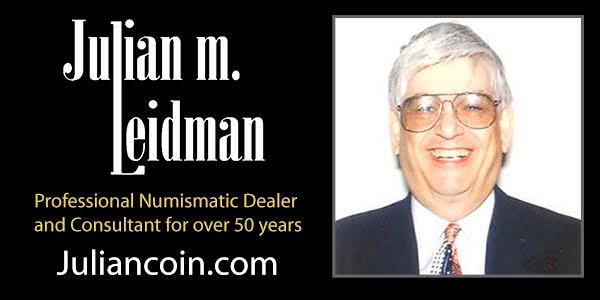
NUMISMATIC NUGGETS: NOVEMBER 18, 2018
Here's a selection of interesting or unusual items I came across in the marketplace this week. Tell us what you think of some of these. -Editor
1849 Mormon Valley Note
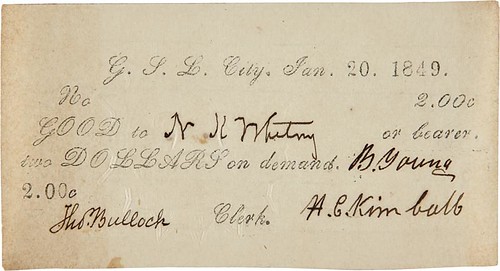
Small printed paper slip, approximately 2 x 3 3/4 inches. Overall condition is excellent. Blindstamped with the official seal of the Twelve Apostles, and signed in manuscript by Brigham Young, Thomas Bullock, and Heber C. Kimball. N.K Whitney is named as payee in manuscript. No serial number. This small piece of paper money printed by the Mormon Church in Salt Lake City is an example of the earliest recorded printing done in Utah.
Called a "Valley Note" by Alvin E. Rust, this form of paper currency was printed in several denominations using a font of script type of the style used for calling cards. McMurtrie quotes a passage from a manuscript history of Brigham Young which describes the interesting circumstances under which this paper money was printed:
"They had gold dust, but many refused to take it, as there was a waste in weighing it for exchange. To meet this want, we employed brother John Kay to coin the dust, but upon trial he broke all the crucibles and could not proceed. I then offered the gold dust back to the people, but they did not want it. I then told them we would issue paper till the gold dust could be coined. The Municipal Council agreed to have such a currency, and appointed myself and President Heber C. Kimball and bishop N.K. Whitney to issue it. The first bill, for one dollar, was issued on the first of this month [January 1849]. The bills were signed by Brigham Young, Heber C. Kimball, & Thomas Bullock, clerk."
Mormon history is fascinating all by itself, but when combined with numismatics it's hard to beat. This is from the stock of antiquarian bookseller William Reese Company. -Editor
To read the complete lot description, see:
PRINTED "VALLEY NOTE" CURRENCY IN DENOMINATION OF $2.00, SIGNED BY
BRIGHAM YOUNG WITH PRINTED HEADING: "G.S.L. CITY, JAN, 20, 1849"] (https://www.abebooks.com/servlet/BookDetailsPL?bi=30103208223)
1881 U.S. Army Essay Prize Medal

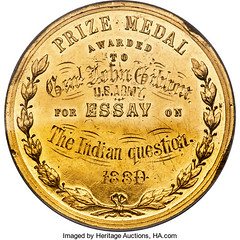
1881 Military Service Institution Gold Medal, Awarded to General John Gibbon -- Reverse Rim Filed -- NGC Details. Unc. 51 mm. The reverse is engraved (AWARDED TO) Gen'l John Gibbon / U.S. ARMY (FOR ESSAY ON) The Indian Question / 1881/0. The medal is lightly bent and exhibits delicate hairlines. The edge displays ornate markings, likely as presented.
Gibbon's article "Our Indian Question" was published in the 1881 volume of the Journal of the Military Service Institution of the United States. The organization was founded by army officers in 1878 and was defunct by 1920.
A black and white image of an obverse of a 1878-dated Military Service Institution gold medal appears in the Wikipedia article for the organization.
John Gibbon (1827-1896) graduated from West Point in 1847 and served as a U.S. Army officer until 1891. During the Civil War, he was wounded at both Fredericksburg and Gettysburg. The arrival of Gibbon's troops in June 1876 likely prevented the massacre of Major Reno's men in Montana, days after Custer's Last Stand. Gibbon's grave is at Arlington National Cemetery.
From the Heritage December 6, 2018 sale. -Editor
To read the complete lot description, see:
1881 Military Service Institution Gold Medal, Awarded to General John Gibbon -- Reverse Rim Filed
(https://coins.ha.com/itm/military-medals/1881-military-service-institution-gold-medal-awarded-to-general-john-gibbon-reverse-rim-filed-ngc-details-unc/a/1282-4105.s
Book: Communion Tokens of the Presbyterian Churches in Ireland
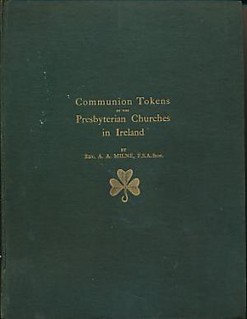 Title: Communion Tokens of the Presbyterian ...
Title: Communion Tokens of the Presbyterian ...
Publisher: Fraser, Asher & Co. Ltd, Glasgow
Publication Date: 1920
Binding: Hardcover
Edition: Limited Edition 92/300.
105pp, interleaved with blanks. Includes a loose letter from the author dated 18/4/22. VG : in very good condition without dust jacket with protective cover. Browning to eps Green/gilt hardback cloth cover.
Books on Communion tokens are important and generally quite rare, usually published in small editions. But is the author of this work THE A. A. Milne of children's book fame? Well, we've discussed this before actually, way back in October 2001. Here's the complete article. -Editor
A NUMISMATIC WRITER AT POOH CORNER?
Asylum Editor E. Tomlinson Fort and his wife Gosia write:
"Recently, Larry Dziubek brought to our attention an interesting tidbit. There is a book entitled "Communion Tokens of the Presbyterian Churches in Ireland" by A.A. Milne (published 1920). Apparently there are a number of people, of whom Larry is not one, who think that this person is the same gentleman who created Winnie-the-Pooh.
After some checking it was quickly confirmed that they are two very different people. The creator of Winnie-the-Pooh was Alan Alexander Milne (1882-1956) who lived most of his life, and set his famous characters in, southern England.
The author of the communion token book is Reverend Alexander Allan Milne (born 1857) who seems to have resided in Scotland. We have not been able to ascertain if the two gentlemen were related. Thus, sadly, numismatic literature does not seem to have been one of the things that Tiggers do best."
To read the earlier E-Sylum article, see: A NUMISMATIC WRITER AT POOH CORNER? (http://www.coinbooks.org/esylum_v04n41a07.html)
To read the complete lot description, see:
Communion Tokens of the Presbyterian Churches in Ireland. Signed limited
edition with signed letter (https://www.abebooks.com/servlet/BookDetailsPL?bi=30136882987)
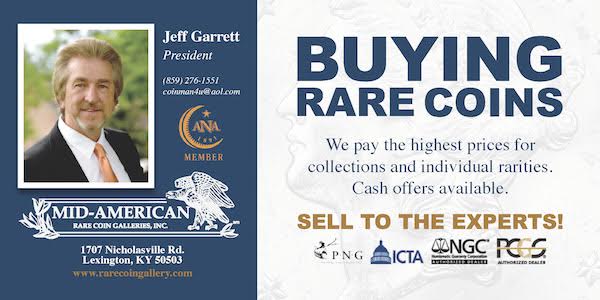
HESS DIVO AUCTION 335
Auction 335 from Hess Divo AG, Zurich will close December 6, 2018. Here's the press release. Some great coins here. -Editor
Greek Coins with Excellent Pedigrees
On December 6, 2018, Hess Divo AG will hold their 335th auction. It includes beautiful Greek treasures from, among others, the Abou Taam Family Collection. In addition, coin rarities from antiquity to the present day, from Switzerland, Europe, and all over the world will be sold. One special highlight: a collection of Japanese obans and kobans.
Those who collect coins of great quality should mark their calendar for December 6, 2018. On what is celebrated in some countries as Saint Nicholas Day, the long-standing auction house Hess Divo AG will hold its 335th auction at the Hotel Baur au Lac. The auction includes a selection of the most beautiful coins – from antiquity to the present day, from Switzerland, Europe, and all over the world.
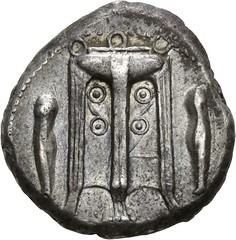
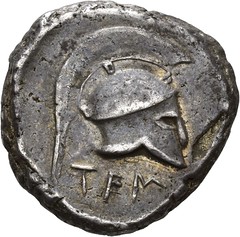
((01 – No. 7. Temesa (Bruttium). Nomos, around 450 BC. From the Moretti and Dr. H. Maag Collections. Very rare. Nice toning. Extremely fine. Estimate: 40,000,- CHF.))
Greek coins from well-known collections
This Greek section encompasses only 64 coins. Yet, all of them are extremely rare, they are of great historical interest as well as of the most
beautiful style, and they all have exceptional pedigrees as some of them originate from well-known collections such as the Moretti or Kunstfreund.
Let us use an extremely rare nomos from Temesa as an example. Its obverse features a Corinthian helmet, but its reverse shows an image reminiscent of
the city of Kroton: a tripod between two greaves. The extraordinary piece originates from the Moretti Collection, which was on display at the Basel
Museum of Ancient Art for many years.

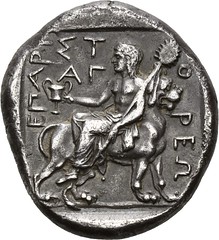
((02 - No. 21. Abdera (Thracia). Tetradrachm, around 365-361. From the Prof. C. Severeanu and Gillet Collections. Extremely rare, probably the second known specimen. Beautiful toning. Extremely fine. Estimate: 125,000,- CHF.))
Possibly the most spectacular piece was part of the Kunstfreund Collection: It is a tetradrachm from Abdera that depicts Dionysus with a crater and thyrsus placed on the back of a panther.
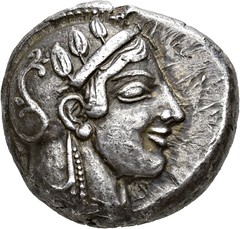
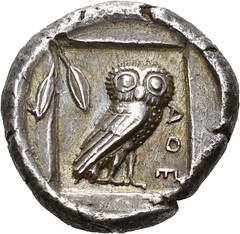
((03 – No. 40. Athens (Attica). Didrachm, around 475-465. Transitional style. From the Consul E. F. Weber and Goekopp Collections. Very rare denomination of a rare issue. Beautiful toning. Extremely fine. Estimate. 100,000,- CHF.))
The pedigree of a didrachm from Athens dates even further back. It originates from the Consul E. F. Weber Collection, which was sold in 1908. This piece, which is depicted in all of the important reference books on the coinage of Athens, shows the owl in a well-defined Quadratum Incusum.
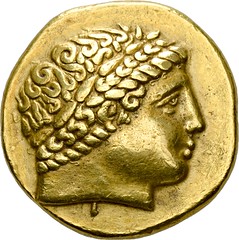
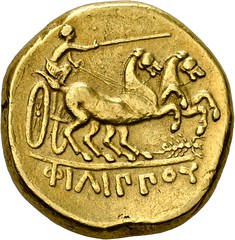
((04 - No. 76. Celtic coins. Helvetii. Imitation of the gold staters of Philipp II. Double gold stater. From the S. Pozzi, Sandars, J. W. Garrett and John Hopkins University Collections. Very rare. Almost extremely fine. Estimate: 15,000,- CHF.))
Celtic rarities
A spectacular Helvetian stater sold in this auction, which was published in the Acta Archaeologica in 1942 already, used to be part of the Professor
Pozzi Collection. It represents the 20 lots of carefully selected Celtic coins, which were struck by, among others, the Parisii, Veneti, and
Vindelici. It also includes a tetradrachm minted in the region surrounding the Middle Danube.

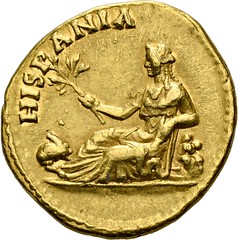
((05 - No. 98. Hadrian, 117-138. Aureus, around 134-138. Rv. HISPANIA. From Adolph Hess AG - Bank Leu Auction 45 (1970), no. 522. Rare. Attractive style. Almost extremely fine. Estimate: 7,500,- CHF.))
Roman aurei as the highlight of the Roman coin section
An abundance of reasonably estimated Roman gold coins predominates the Roman coin section. It includes, inter alia, coins of Lucius Verus, Herennia,
Estruscilla, Tacitus, as well as the Tetrarchs.
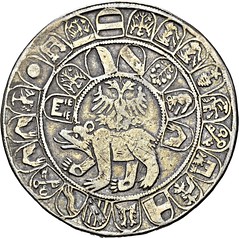
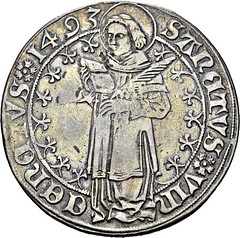
((06 - No. 132. Switzerland. Berne. Guldiner 1493. From the Bachofen and Wüthrich Collections. Very rare. Nice toning. Very fine. Estimate: 5,000,- CHF.))
Hess Divo AG’s specialty: Swiss coins and medals
As always, Hess Divo AG offers a great selection of Swiss coins and medals, some of which with old and well-known pedigrees. A fitting example is the
very rare guldiner struck in Berne in 1493 depicting Saint Vincent on its reverse. This coin was already part of the Bachofen Collection, which Leo
Hamburger designated “one of the oldest and most important specialized collections of Swiss coins and medals” when it was sold on June 18-19, 1918.
The fact that the coin then went on to become part of the Wüthrich Collection increases its appeal even further.
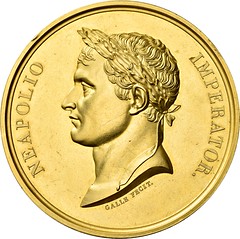
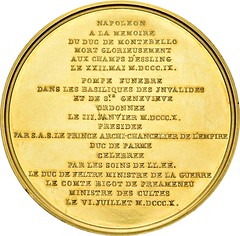
((07 - No. 208. France. Napoleon. Gold medal 1810 by medalist Galle, minted to mark the passing of Maréchal Jean Lannes, Duc de Montebello. From the Bonaparte Collection, Leu Auction 14 (1975), no. 330. Extremely rare in gold. Estimate: 25,000,- CHF.))
European coins and medals
Next up are European coins and medals with a focus on France. The selection ranges from the Merovingians to Napoleon III. Let us highlight one
extremely rare gold medal here, which, just this once, is not only historically but also sociologically interesting. In 1810, Napoleon dedicated one
of his historical medals to the passing of Maréchal Jean Lannes, Duc de Montebello. This man constituted the embodiment of Napoleon’s statement
claiming that every single French soldier carried a marshal's baton in his knapsack. Lannes was the son of a groom and was working for a dyer
before he voluntarily joined the army in 1792. Due to his individual bravery, his charisma, and his uncompromising support of Napoleon, he advanced
to the highest ranks before dying near Aspern and Essling at the age of 40. Lannes, who was laid to rest at the Pantheon in Paris, was the only
officer who was allowed to use the informal address of “tu” with the emperor.
The mere fact that an official medal – which was originally used as a way of glorifying the head of state, his family, and his achievements – was dedicated to the descendant of a simple groom, gives proof to the powerful social implications of the French Revolution.
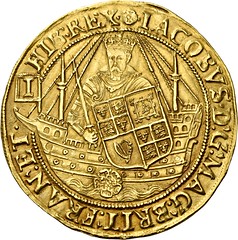
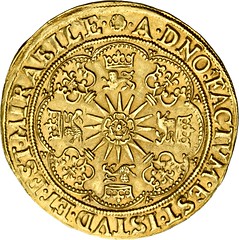
((08 – No. 212. Great Britain. James I., 1603-1625. Spur Ryal. From the Willett, Addison, Lord Hastings, Roth and L. M. LaRiviere Collections. Extremely fine in this condition. Miniscule repairing marks at the upper gun port of the quarterdeck, otherwise extremely fine+. Estimate: 20,000,- CHF.))
The Spur Ryal of James I with a detailed depiction of a war vessel of the early 17th century, originates from the Willett Collection, which was sold at Sotheby in 1824. James I, a Stuart king who became the successor of Elizabeth I, is shown as an elderly man along with the English crown, a royal escutcheon, and a sword.
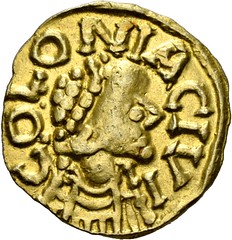
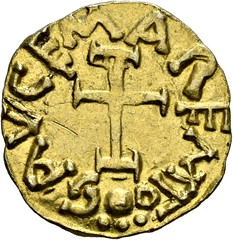
((09 – No. 276. Germany. Cologne. Royal mint of the Merovingians. Dagobert, 623-639.
Triens, undated. Mint master Gaucemares. Second known specimen. Perfectly centered, extremely fine. Estimate: 25,000,- CHF.))
An undated triens from Cologne which was made by the Merovingian mint master Gaucemares and which features a portrait of King Dagobert, is one of the highlights of the section containing coins of the German Empire. There are only two surviving specimens of this type. The one offered in this auction is the better preserved one of the two.
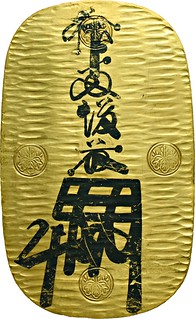
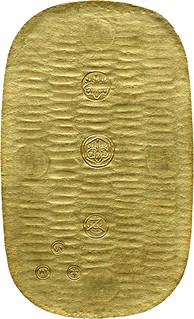
((10 - No. 288. Japan. Edo period, 1837-1848. Oban, undated. Extremely rare. Including a certificate of the Japan Numismatic Dealers Association. Uncirculated. Estimate: 25,000,- CHF.))
An oban of the Bakufu
Hess Divo AG is pleased to be able to offer a small selection of Japanese gold coins from the Edo period. These precious metal pieces issued on
behalf of the head of the Treasury were the last ones before the introduction of Western-style coins. They were forged from gold sheets, which was
cut into pieces of a predetermined weight for this purpose.
What is remarkable here is the fact that part of the marking was originally only applied using ink. This technique was retained in the production of obans, but was dismissed in favor of countermarks in the production of kobans. This should come as no surprise seeing as kobans were meant to be used in everyday money circulation, whereas obans mainly served as presents and rewards.
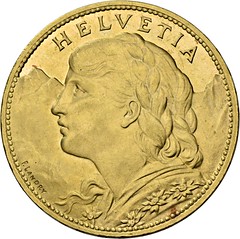
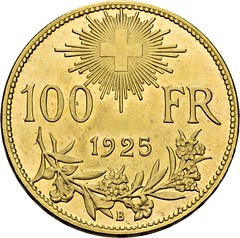
((11 – No. 309. Switzerland. Swiss Confederation. 100 francs 1925, Berne. NGC MS62. Estimate: 10,000,- CHF.))
Coins in slabs
Hess Divo AG has decided to sell coins in slabs in a separate “Slabia” section without complete illustrations.
In this section, the extensive collection of Belgian patterns struck between 1833 and 1933 is particularly striking.
The auction is available online at https://www.sixbid.com/browse.html?auction=5391 .
You can purchase a copy of the catalog at Hess Divo AG, Löwenstrasse 55, CH-8001 Zurich, phone: +41 / (0)44 / 225 40 90, email: mailbox@hessdivo.ch .

COINS STOPPED A BULLET AND SAVED A LIFE
Arthur Shippee and Scott Miller passed along this BBC News article. Thanks! fascinating story. -Editor
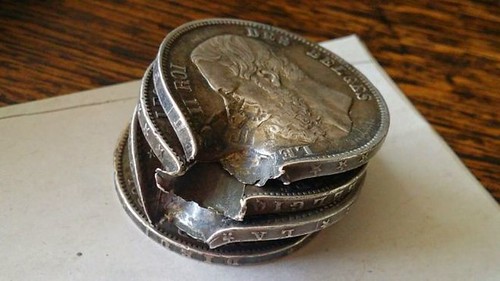
These coins both endangered and saved the life of a soldier in World War One.
Shot after the noise of them "clinging together in his breast pocket... gave his position away... the bullet that should have killed him ricocheted off of the coins thus saving his life".
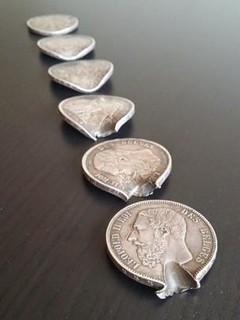 Optatius Buyssens's great-grandson Vincent posted a photo of the coins on Reddit and it received more than 130,000 upvotes in 24
hours.
Optatius Buyssens's great-grandson Vincent posted a photo of the coins on Reddit and it received more than 130,000 upvotes in 24
hours.
"He got kicked in the head by the German soldier who shot him but tricked the soldier into thinking he was dead," Vincent adds.
"When the German soldier left, he and another wounded comrade managed to crawl to safety."
"Three of the coins are from Belgium and three are from France," Phillippe adds.
After the War, Optatius had heart problems but he lived until 1958.
To read the complete article, see:
These coins stopped a bullet and saved a soldier's life
(https://www.bbc.com/news/world-46186430)
1984-P ROOSEVELT DIME WITH CLASHED DIES
The Combined Error Collectors of America (CONECA) publish the journal ErrorScope. The September/October 2018 edition has Part II of an article by Jason Cuvelier on die clashes. The coin images caught my eye, and with permission we're republishing them here with the related text. Thanks to Peter Lukic, Mark Lighterman and Allan Anderson for their assistance. The large image is an overlay which makes it easier to see how the clash aligns. -Editor
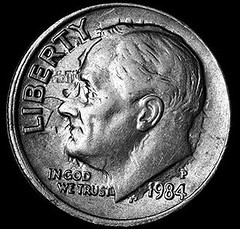
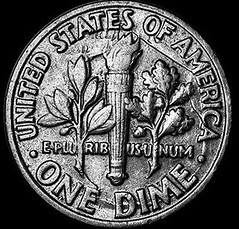
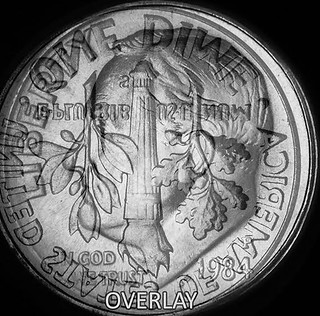 1984P Roosevelt Dime clashed dies.
1984P Roosevelt Dime clashed dies.
1983 and 1984 have an unusually large number of strong clashed dies examples. One of the strongest on a Roosevelt Dime is illustrated here. Naked eye obvious we see E PLU, olive leaves much of ONE, the inside parts of AMERICA, the torch and some of the oak leaves all strongly clashed on the obverse. The reverse shows parts of GOD TRUST, the date and most of the perimeter of Roosevelt’s head.
For more information on CONECA, see:
https://conecaonline.org/

UNION PACIFIC MOVIE TOKEN
Here's an interesting piece of motion picture numismatica I happened across this week. -Editor
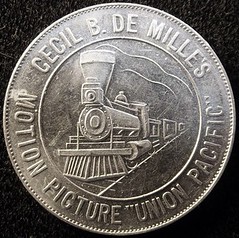
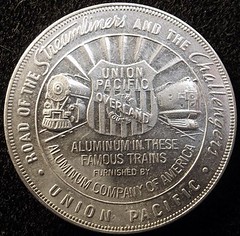
Up for sale is a 1939 advertising and commemorative token. It is aluminum, and measures 32mm in diameter. The obverse reads CECIL B. DEMILLE'S / MOTION PICTURE "UNION PACIFIC" The reverse reads, with t wo railroad engines and the shield logo of Union Pacific ROAD OF THE STREAMLINERS AND THE CHALLENGERS / UNION PACIFIC / UNION PACIFIC / THE / OVERLAND / ROUTE / ALUMINUM IN THESE / FAMOUS TRAINS / FURNISHED BY / ALUMINUM COMPANY OF AMERICA / UNION PACIFIC (The reverse is the same as those tokens given out during the 1939 Golden Gate Exposition held in San Francisco.)
The world premiere of the movie was held in Omaha, Nebraska in April 1939, with a corresponding 4-day commemoration called the Golden Spike Days Celebration. The piece is in excellent condition with slight wear.
To read the complete article, see:
1939 UNION PACIFIC/CECIL B. DEMILLE MOVIE/TRAIN TOKEN
(OMAHA NEBRASKA/HOLLYWOOD) (https://www.worthpoint.com/worthopedia/1939-union-pacific-cecil-demille-14460329)
There is some additional information on the BrianRxm "Coins in Movies" pages. -Editor
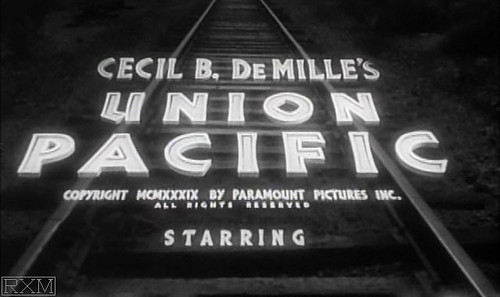
The 1939 Paramount Pictures film "Union Pacific" is an epic Western film about the building of the Union Pacific railroad across the United States in the late 1860's as half of the transcontinental railroad which was authorized in 1862 by the US Congress and President Abraham Lincoln.
The route of the railroad went from Iowa to Utah, where it was to meet the Central Pacific railroad being built from San Francisco, California.
A wealthy financier Asa Barrows attempts to slow down the railroad effort in a scheme to lower the price of railroad stock. The financier hires two men, Sid Campeau and Dick Allen to run gambling casinos and saloons to distract the mostly Irish railroad workers.
Jeff Butler is a railroad troubleshooter who attempts to block Campeau and Allen. Jeff and Dick were soldiers in the Union Army together but now they are on opposite sides. Both are competing for Mollie Monahan who manages the railroad mail and telegraph office.
The film was one of Cecil B. DeMille's epic productions and was made in cooperation with the modern Union Pacific Railroad.
The Union Pacific Railroad and the Aluminum Company of America (ALCOA) issued a series of 32 mm aluminum tokens to advertise the trains and one to advertise the film.
Some silver dollar size prop coins appear on a gambling casino table.
To read the complete article, see:
Coins in Movies Union Pacific (1939)
(http://www.brianrxm.com/comdir/cnsmovie_unionpacific.htm)
HAMILTON'S SOCIETY OF THE CINCINNATI MEDAL
Here's an excerpt from a Fox News item about a museum display of items belonging to Alexander Hamilton, including his Society of the Cincinnati medal. -Editor

Hamilton's Society of the Cincinnati Eagle
Extremely rare artifacts that belonged to Alexander Hamilton have been loaned to the Museum of the American Revolution by the Founding Father’s fifth-great-grandson.
A member of George Washington’s staff during the Revolutionary War, Hamilton helped ratify the U.S. Constitution and became the first Secretary of the Treasury. He was mortally wounded in a duel by Vice President Aaron Burr in 1804. His remarkable life is the subject of the wildly popular Broadway show, “Hamilton.”
The artifacts, which have gone on display at the Philadelphia museum, include a Society of the Cincinnati Eagle insignia owned and worn by the Founding Father and a gold mourning ring worn by his widow, Elizabeth Hamilton. The ring contains a lock of Hamilton’s hair.
The Society of the Cincinnati was founded by Continental Army officers at the end of the Revolutionary War and takes its name from Cincinnatus, the general credited with saving the Roman republic. Hamilton was a founding member of the Society, which is the nation’s oldest patriotic organization and aims to preserve the memory of the American Revolution.
To read the complete article, see:
Alexander
Hamilton’s descendant loans extremely rare family heirlooms to Revolutionary War museum
(https://www.foxnews.com/science/alexander-hamiltons-descendant-loans-extremely-rare-family-heirlooms-to-revolutionary-war-museum)
To read earlier E-Sylum articles, see:
SOCIETY OF THE CINCINNATI MEDAL ON DISPLAY
(http://www.coinbooks.org/v21/esylum_v21n24a17.html)
CATALOGUE: SOTHEBY LAFAYETTE GOLD ORDER OF THE SOCIETY OF THE CINCINNATI
(http://www.coinbooks.org/esylum_v10n50a07.html)
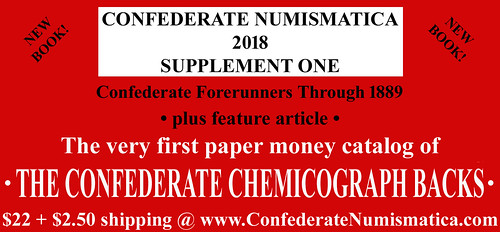
CIVIL WAR PHOTO SLEUTH
There's a new tool available for researchers, numismatic and otherwise - a Civil War "photo sleuth" application that uses facial recognition technology to identify otherwise unknown people in Civil War era photographs. Perhaps we can learn some new information about numismatists of the era. Here's an excerpt from a November 15, 2018 Slate article. -Editor

When Kurt Luther walked into Pittsburgh’s Heinz History Center in 2013 to attend an exhibition about Pennsylvania during the Civil War, he didn’t expect to be greeted by his great-great-great-uncle. A computer scientist and Civil War enthusiast, Luther had been drawn to researching his own family’s connection to the conflict, gradually piecing together information over years and years. But his searches had always failed to turn up a photograph, and Luther was ready to give up on the possibility of ever seeing his ancestors’ faces. It was only through sheer happenstance that, walking through the History Center that day, Luther had spotted an album of portraits of the men of Company E, 134th Pennsylvania––his great-great-great-uncle’s unit. Laying eyes on his relative’s face for the first time, he later wrote, felt like “closing a gap of 150 years.”
Five years later, Luther launched Civil War Photo Sleuth, a web platform dedicated to closing the gap a little further. Together with Ron Coddington (editor of the magazine Military Images), Paul Quigley (director of the Virginia Center for Civil War Studies), and a group of student researchers at Virginia Tech, Luther crafted a free and easy-to-use website that applies facial recognition to the multitude of anonymous portraits that survive from the conflict, in the hopes of identifying the sitter. When a user uploads a photograph, the software maps up to 27 distinct “facial landmarks.” Users are further able to refine their searches by adding filters for uniform details that could offer clues about rank. (Three chevrons and a star, for instance, indicates a rank of ordnance sergeant for both the Union and Confederate armies, while shoulder straps with an eagle were worn by Union colonels.) From there, the program cross-references the photo with the other images in CWPS’s growing database. The final search results present an array of possible matches (and possible names) for consideration.
“The beauty of CWPS,” he says, “is that the more people use it, the more information gets added, leading to more identifications—it’s a virtuous cycle.” In the site’s first month alone, CWPS logged 88 reported identifications, of which 75 were “probably or definitely correct” (and since not all users choose to publicize their identifications, Luther thinks that the real number of matches may have been higher). Given that IDs like this are otherwise rare enough that they make national news when they occur, this is a massive leap forward.
One particularly memorable ID occurred the night before CWPS’s launch in August, as Luther was searching for a sample image for the next day’s demo. After selecting an unidentified portrait from the Library of Congress to demonstrate how to upload and tag photos, Luther ran it through the program. The very first result was a perfect match. More digging turned up yet another portrait of the same sitter, this time with an autograph: Francis Marion Eveleth, assistant surgeon in the 7th Maine Infantry. When Luther presented the match at the launch event the next day, Tom Liljenquist, the man who had donated the photograph to the Library of Congress, was in attendance.
To read the complete article, see:
Who’s Behind That Beard?
(https://slate.com/technology/2018/11/civil-war-photo-sleuth-facial-recognition.html)
THE BOOK BAZARRE
LOOSE CHANGE: NOVEMBER 18, 2018
Here are some additional items I came across in the media this week that may be of interest. -Editor
Coins of the Ptolemies, Part II
CoinWeek published the latest installment of Mike Markowitz's series on coins of the Ptolemies. -Editor
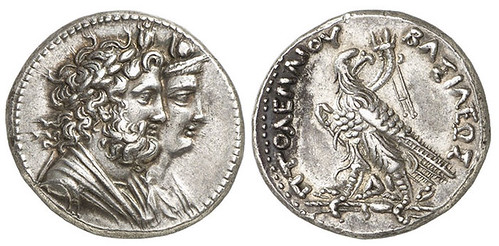
One of the most attractive Ptolemaic silver coins is Ptolemy IV’s tetradrachm bearing the images of Serapis and Isis. Struck at Alexandria and a number of mints in Palestine and Syria, the issue celebrates Ptolemy’s victory over the Seleucid empire at the Battle of Raphia (near Gaza on June 22, 217 BCE). Serapis was a composite Greco-Egyptian god, invented by Ptolemy I as the patron deity of Alexandria. Isis, an ancient and beloved Egyptian goddess of motherhood, magic, and wisdom, is shown as the wife of Serapis
To read the complete article, see:
CoinWeek Ancient Coin Series: The Ptolemies, Part
II (https://coinweek.com/ancient-coins/coinweek-ancient-coin-series-the-ptolemies-part-ii/)
Stories Behind the Portraits on Our Money
Arthur Shippee forwarded this satirical piece from The New Yorker with (fake) stories behind the portraits on money. -Editor
The portrait for the nickel took an incredibly long time to complete, mostly because Jefferson couldn’t settle on the right way to do his hair. For years, he said that the decision to go with a ponytail was one of his greatest regrets. And, on his deathbed, he admitted that he should have gone with “something looser, to represent America’s freedoms through the soft, natural waves of my hair.”
To read the complete article, see:
The Stories Behind the Portraits on Our
Money (https://www.newyorker.com/humor/daily-shouts/the-stories-behind-the-portraits-on-our-money)
Oklahoma State Quarter Hidden Image
In the numismatic-rorschach-test department is this post from digg about a hidden image on the Oklahoma quarter. -Editor

To read the complete article, see:
Oklahoma's State Quarter Has An Inspiring Hidden Image If You Just Rotate It
(http://digg.com/2018/oklahoma-quarter-bird-man)
To read more in Twitter, see:
https://twitter.com/jessemudrick


